Wordiest Shakespeare characters of all time
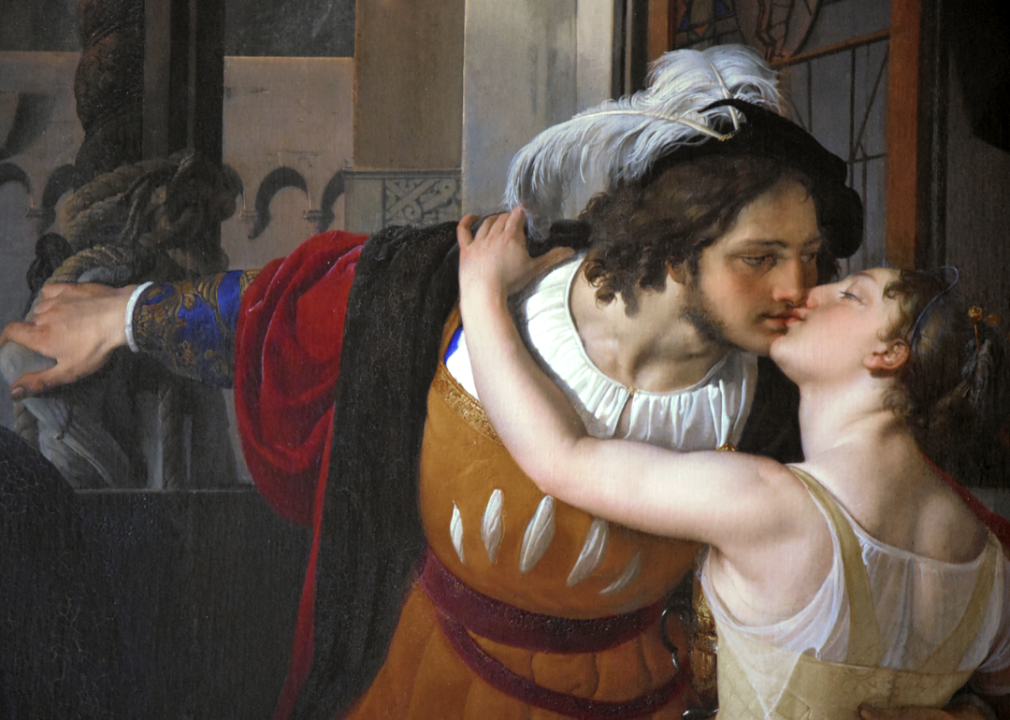
Francesco Hayez // Wikimedia Commons
Wordiest Shakespeare characters of all time
While some of us may have dreaded the Bard during high school, others relish reliving William Shakespeare’s legendary works time and time again in books, plays, and renewed adaptations that continue today on stage and on the silver screen. Indeed, many of our most beloved and critically-acclaimed television and movie stars have taken on some of the most famous and complex Shakespeare characters in notable adaptations, including James Earl Jones, Anne Hathaway, and Leonardo DiCaprio.
In the spirit of this year’s celebration of National Shakespeare Day on April 23, Stacker has compiled this comprehensive list of the top 40 most prolific Shakespeare characters of all time (sans the iambic pentameter for easy reading), using data provided by Open Source Shakespeare.
Inspired to deliver a romantic monologue to a loved one? Searching for the most clever or evil way to approach someone with bad news? These iconic characters have you covered with all of the wit, charm, and eloquence you’ll need.
![]()
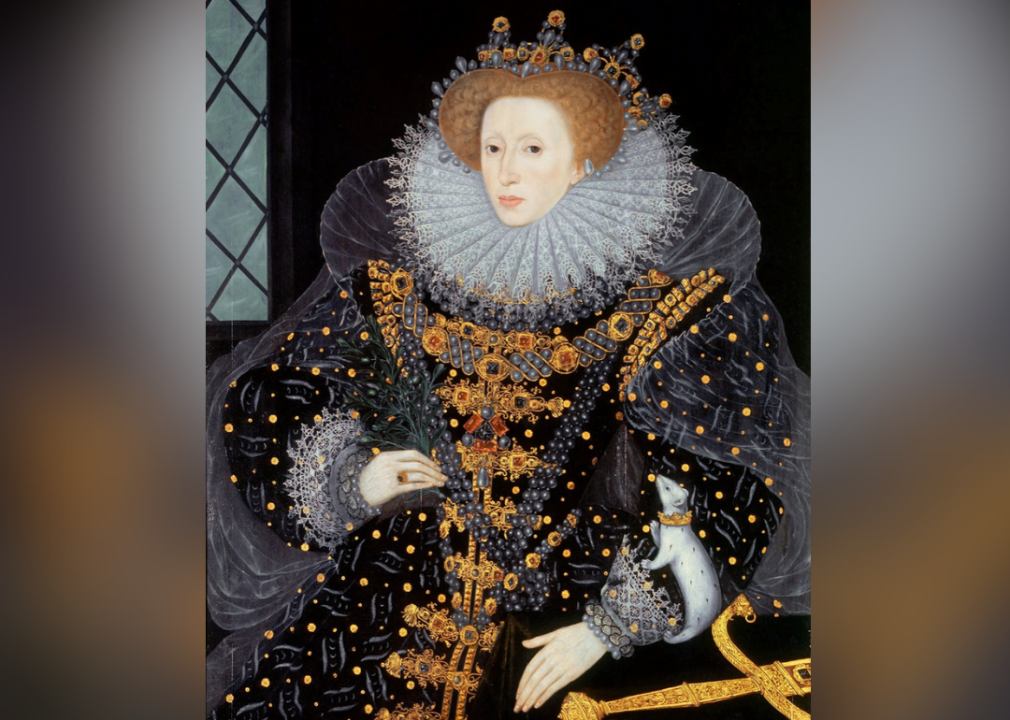
William Segar // Wikimedia Commons
#40. Queen Elizabeth
Queen Elizabeth appeared in “Henry VI, Part 3” and “Richard III.”
Speeches: 129
Queen Elizabeth was known as Lady Grey before she married King Edward IV in exchange for the return of her lands. Her willful and passionate spirit was interpreted as a foil to Richard III, which he often took as a threat to his power. The character has been played by notable actors Mary Kerridge and Annette Bening.
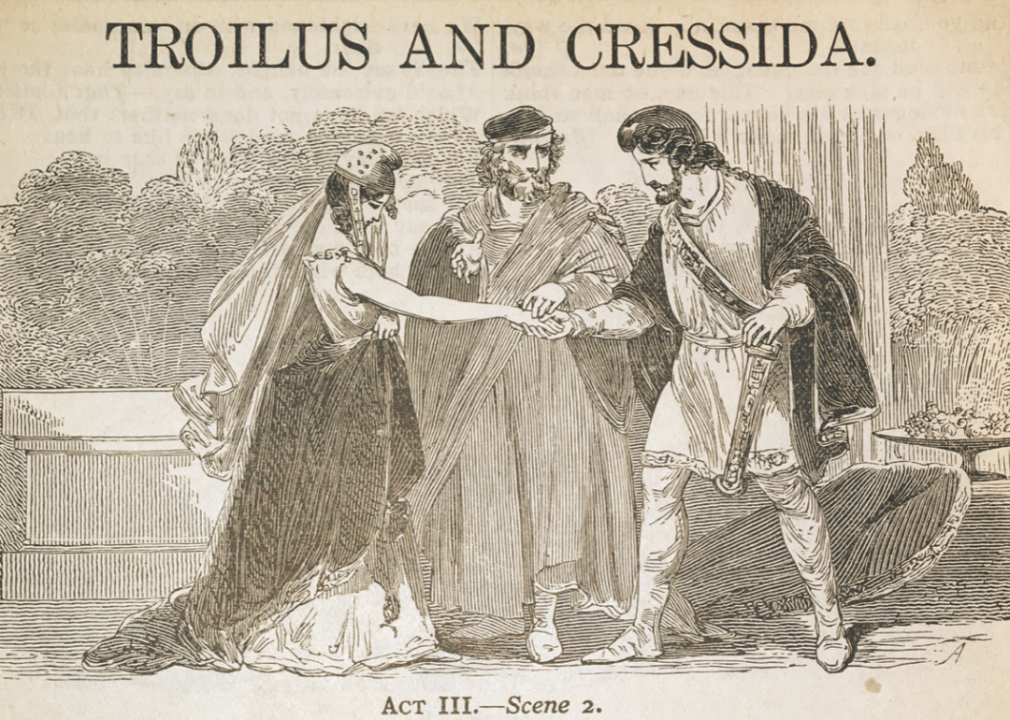
Public Domain // Wikimedia Commons
#39. Troilus
Troilus appeared in “Troilus and Cressida.”
Speeches: 131
Troilus was a prince of Troy and brother to Hector and Paris. He is deeply in love with Cressida, a fellow Trojan who was exchanged to the Greeks for a Trojan prisoner of war and vows to kill Diomedes when Cressida agreed to an affair. One notable actor who played Troilus is Albert Finney.
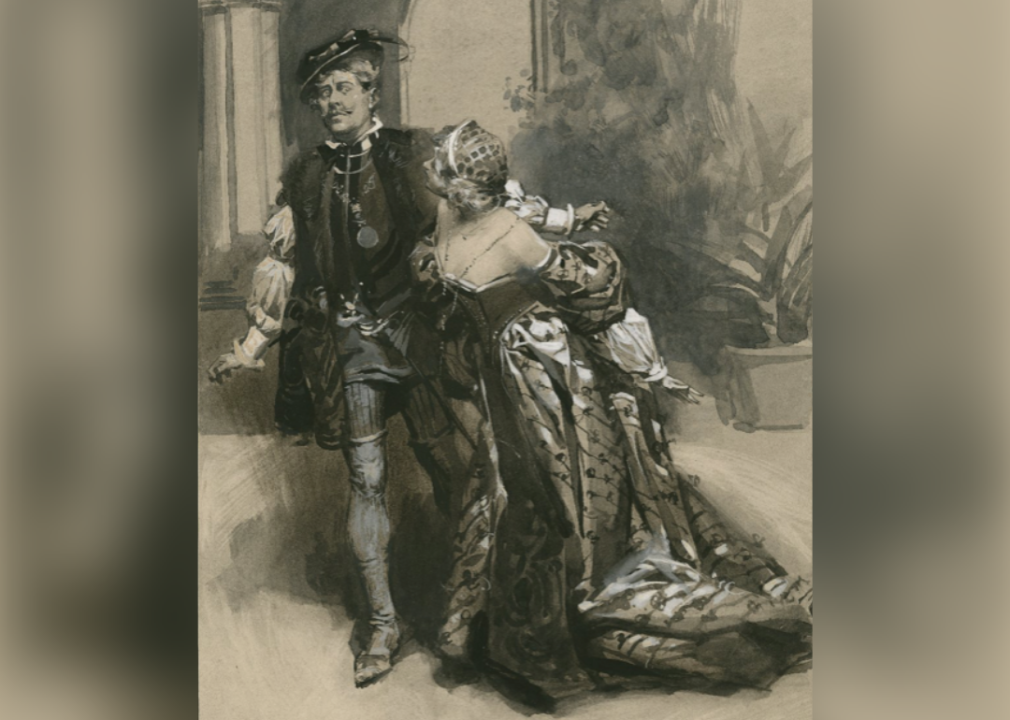
Max Cowper // Wikimedia Commons
#38. Benedick
Benedick appeared in “Much Ado About Nothing.”
Speeches: 134
Benedick was one of the central characters of “Much Ado About Nothing,” where over the course of the play he turned from a misogynistic bachelor to a devoted lover who confronted his best friend on his loved one’s behalf. A few notable actors who played Benedick include Derek Jacobi, Sir Kenneth Branagh, and David Tennant.
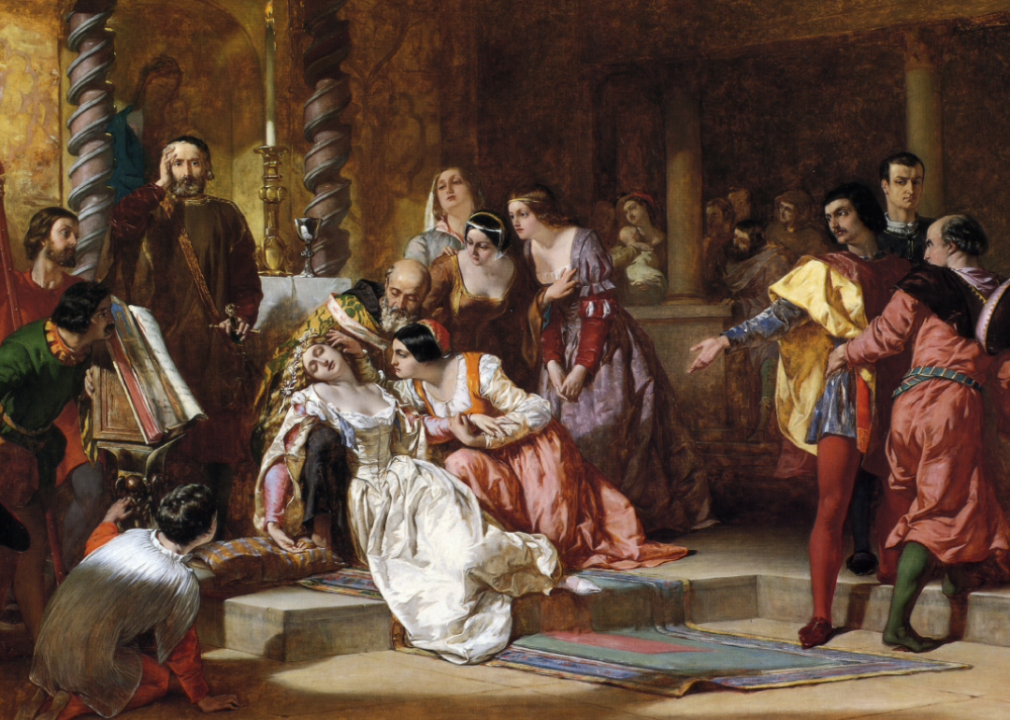
Alfred W. Elmore // Wikimedia Commons
#37. Don Pedro
Don Pedro appeared in “Much Ado About Nothing.”
Speeches: 135
Don Pedro was the prince of Aragon who used his influence to manipulate the people around him to positive ends, such as the pairing of Hero and Claudio and Benedick and Beatrice. He was noticeably the only single person at the end of the play, despite the fact that he was a prince. One notable actor who played Don Pedro on the silver screen is Denzel Washington.
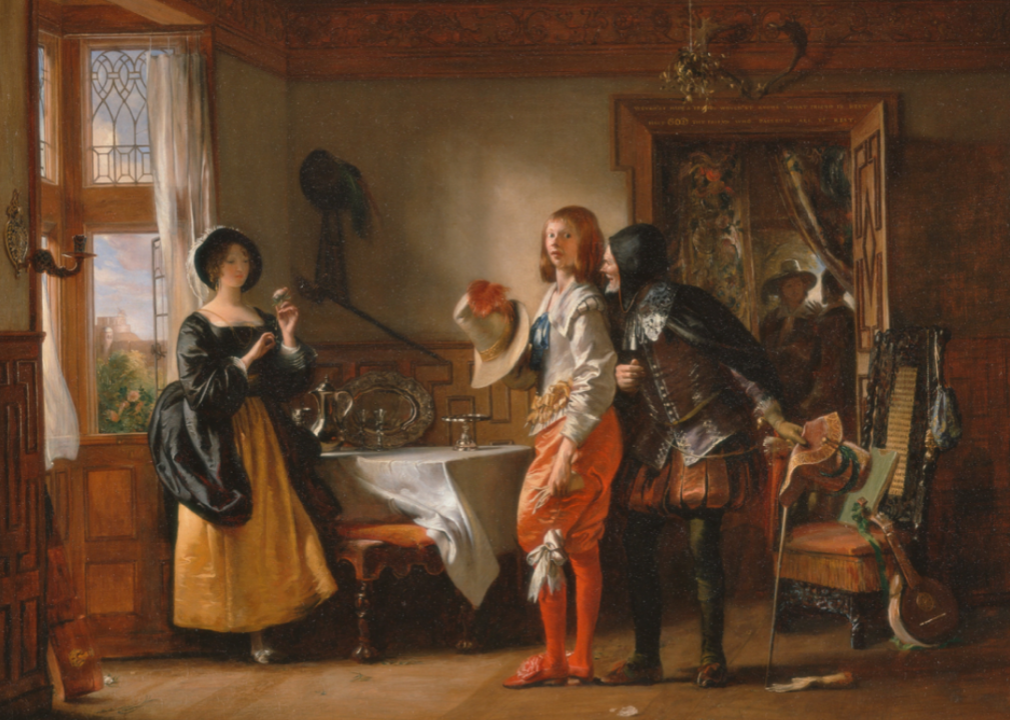
Charles Robert Leslie // Wikimedia Commons
#36. Robert Shallow
Robert appeared in “Henry IV, Part 2” and “Merry Wives of Windsor.”
Speeches: 136
Robert Shallow was a wealthy landowner who was a justice of the peace in Gloucester and was often depicted as an arrogant member of the upper class. He was interpreted as a foil to Sir John Falstaff (#2 on our list), who took advantage of Robert’s wealth. The audience is expected not to feel too much sympathy for Robert because he is depicted as an antagonistic character. David Bamber played the role in the 2012 TV series “Hollow Crown.”
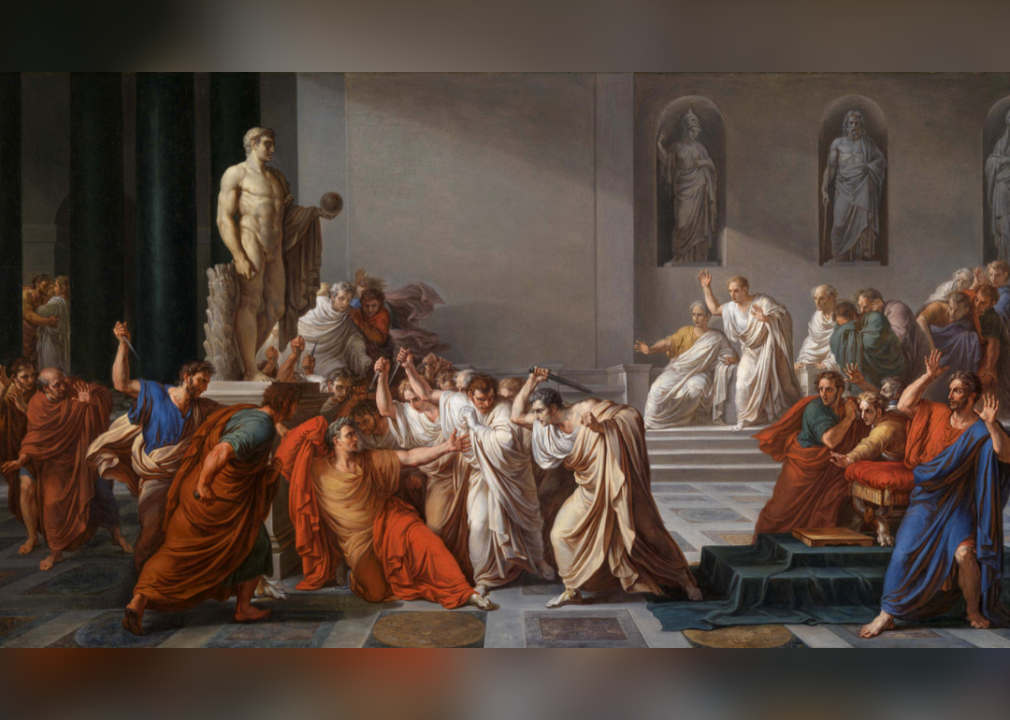
Vincenzo Camuccini // Wikimedia Commons
#35. Cassius
Cassius appeared in “Julius Caesar.”
Speeches: 140
Cassius leads conspirators against Julius Caesar; he greatly resents Caesar’s power over the Roman people and how he revels in it. Cassius is also responsible for persuading Brutus to join the other conspirators. One of his most famous lines, “The fault, dear Brutus, is not in our stars, But in ourselves, that we are underlings,” inspired the title of the popular John Green YA novel and film, “The Fault in Our Stars.” Notable actors who have played Cassius include John Gielgud, Richard Johnson, David Collings, Cyril Nri.
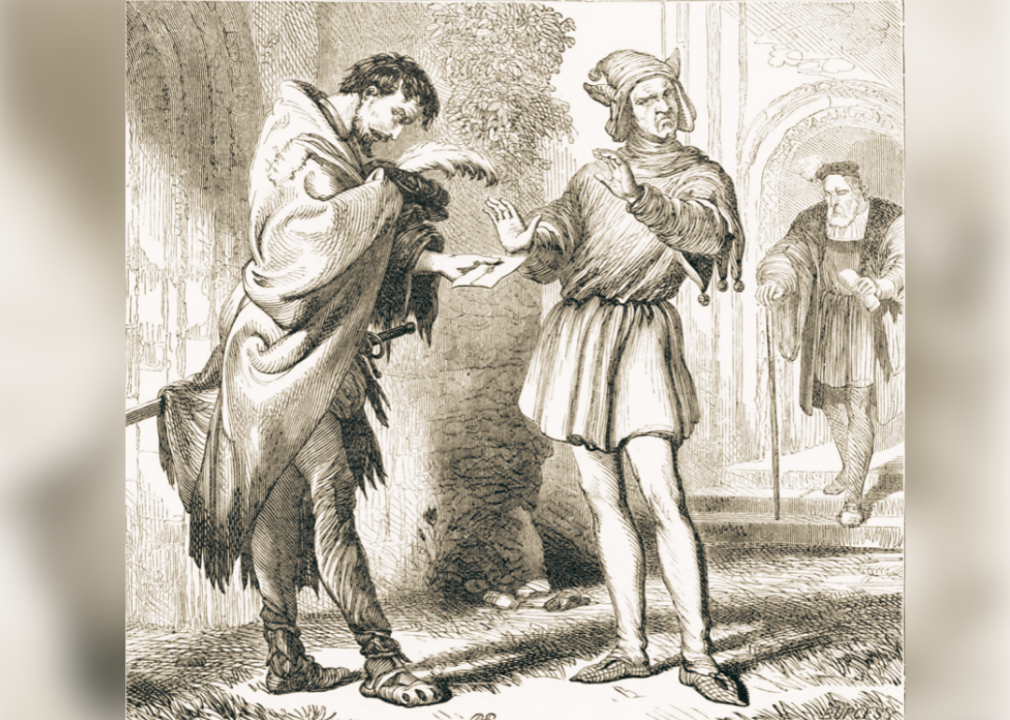
Michael Goodman // Wikimedia Commons
#34. Parolles
Parolles appeared in “All’s Well that Ends Well.”
Speeches: 141
Parolles was a braggart soldier who was a liar, coward, and the best friend of Bertram. He had a bad influence on Bertram, which included encouraging him to run away to war and to have an extra-marital affair. Notable actors who have played Parolles include Larry Pines, Peter Jeffrey, and Conleth Hill.
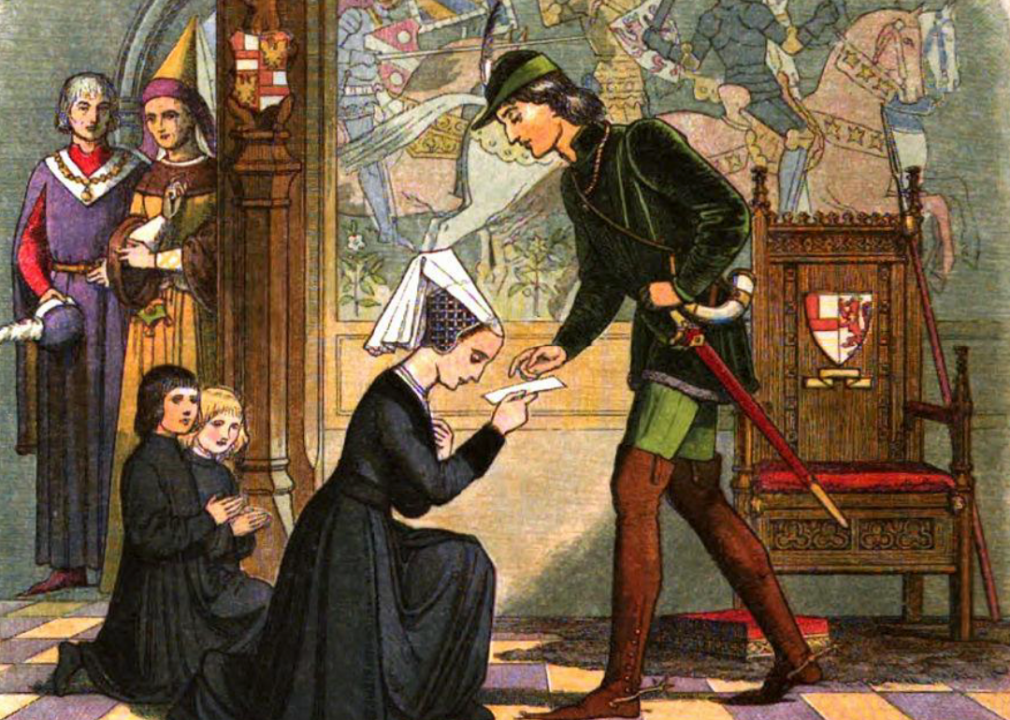
Public Domain // Wikimedia Commons
#33. King Edward IV (Plantagenet)
King Edward IV appears in “Henry VI, Part 2,” “Henry VI, Part 3,” and “Richard III.”
Speeches: 144
King Edward IV is a member of the house of York and slighted some of his advisers and political supporters by marrying a commoner, Lady Grey, instead of a French noblewoman. He tries to calm the feuding factions of the nobility but fails, and is unaware that his brother Richard is doing his best to thwart and manipulate him.
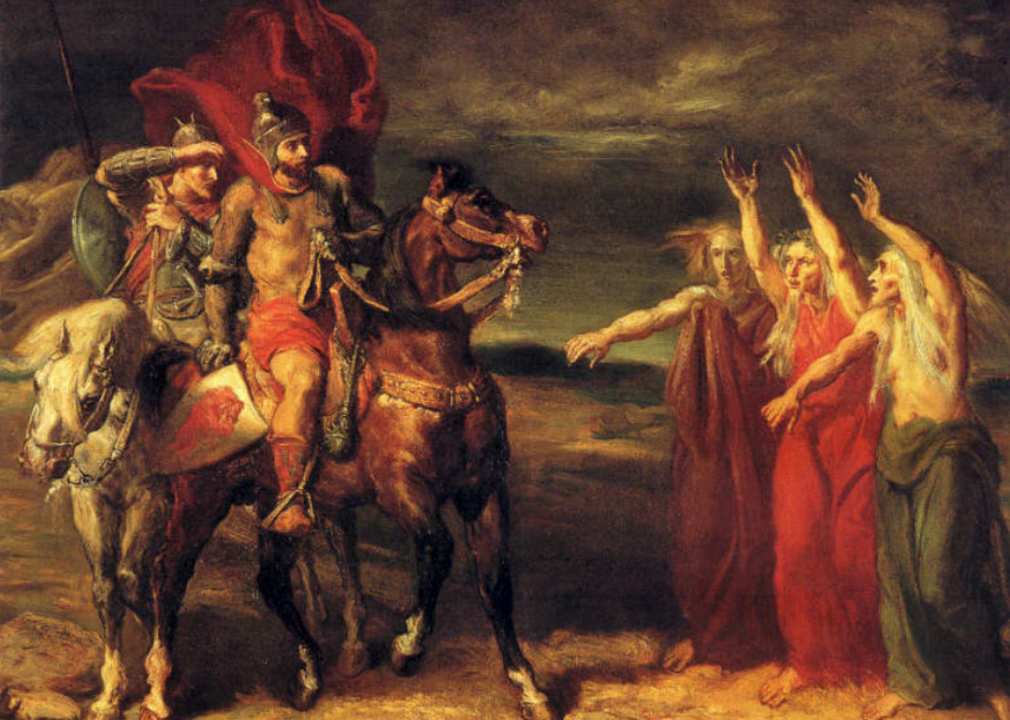
Theodore Chasseriau // Wikimedia Commons
#32. Macbeth
Macbeth appeared in “Macbeth.”
Speeches: 146
Macbeth was a general in the army of Scottish King Duncan, whom he killed after hearing a prophecy that he will be king. Throughout the play, he struggled with his ambition to maintain the throne and his guilt over killing in order to do so. Notable actors who played Macbeth include David Garrick, William Charles Macready, Henry Irving, Sir Ian McKellen, and James McAvoy.
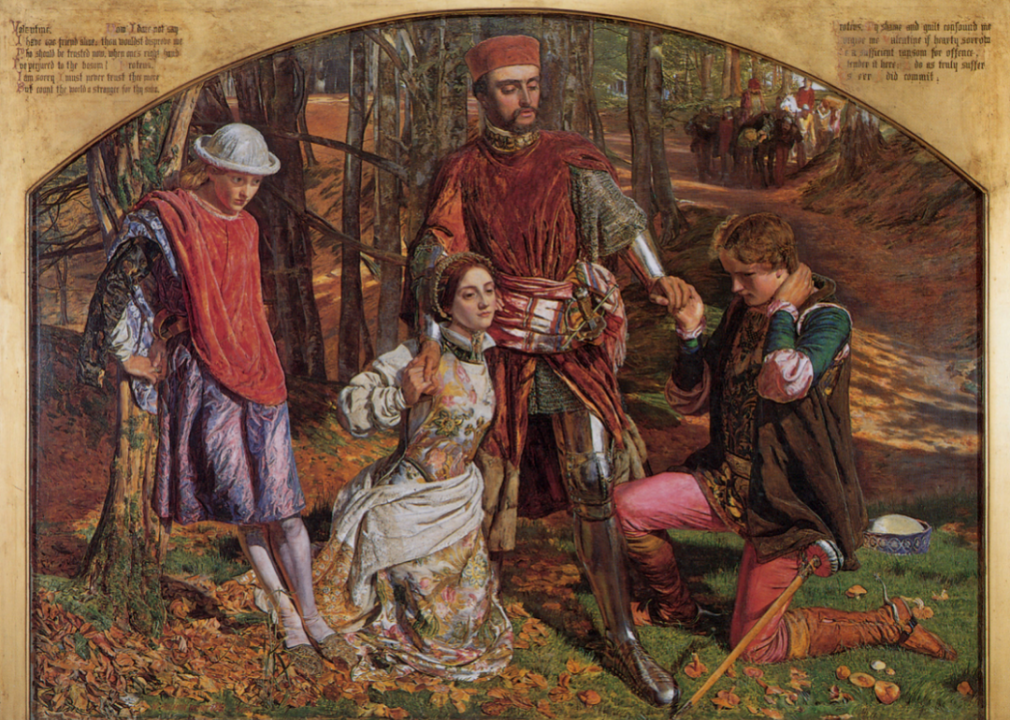
William Holman Hunt // Wikimedia Commons
#31. Proteus
Proteus appeared in “The Two Gentlemen in Verona.”
Speeches: 147
Proteus was a nobleman in Verona whose best friend was Valentine; he pledged his devotion to Julia before joining Valentine in Milan. Proteus betrayed Valentine by attempting to seduce Silvia and threatens her with rape; after seeing Valentine and Julia at the end of the play, his relationships with them were mended.
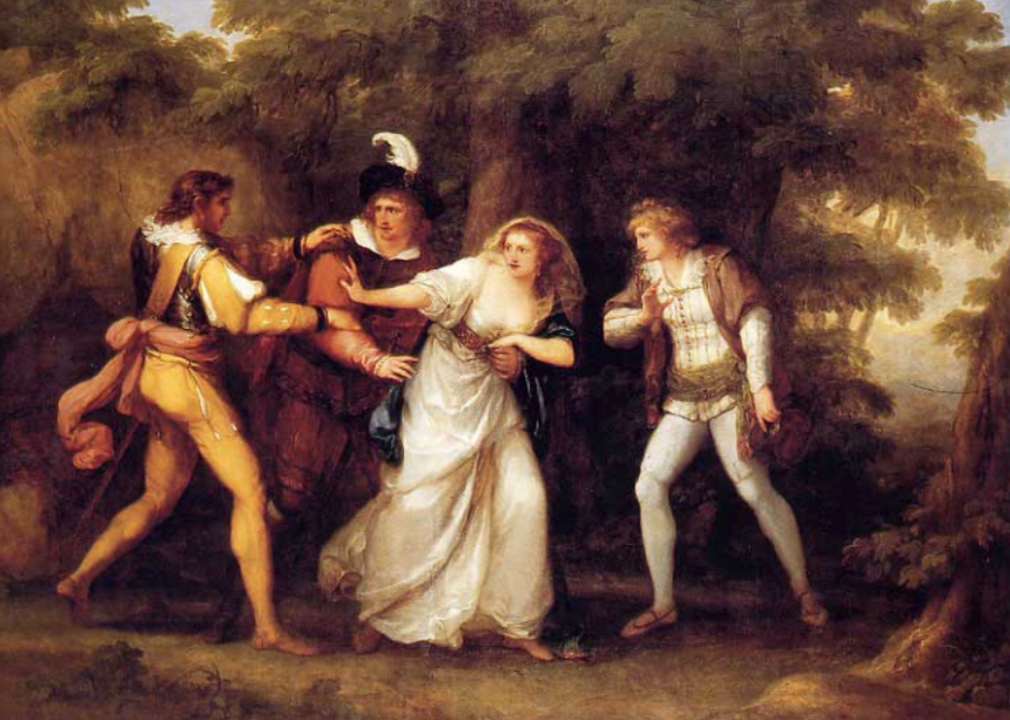
Angelica Kauffmann // Wikimedia Commons
#30. Valentine
Valentine appeared in “The Two Gentlemen of Verona.”
Speeches: 149
Valentine was a nobleman in Verona who traveled to Milan and fell in love with Silvia. He was betrayed by Proteus and banned from Milan, but by the end of the play his willingness to forgive and his devotion to Silvia earned her father’s approval.
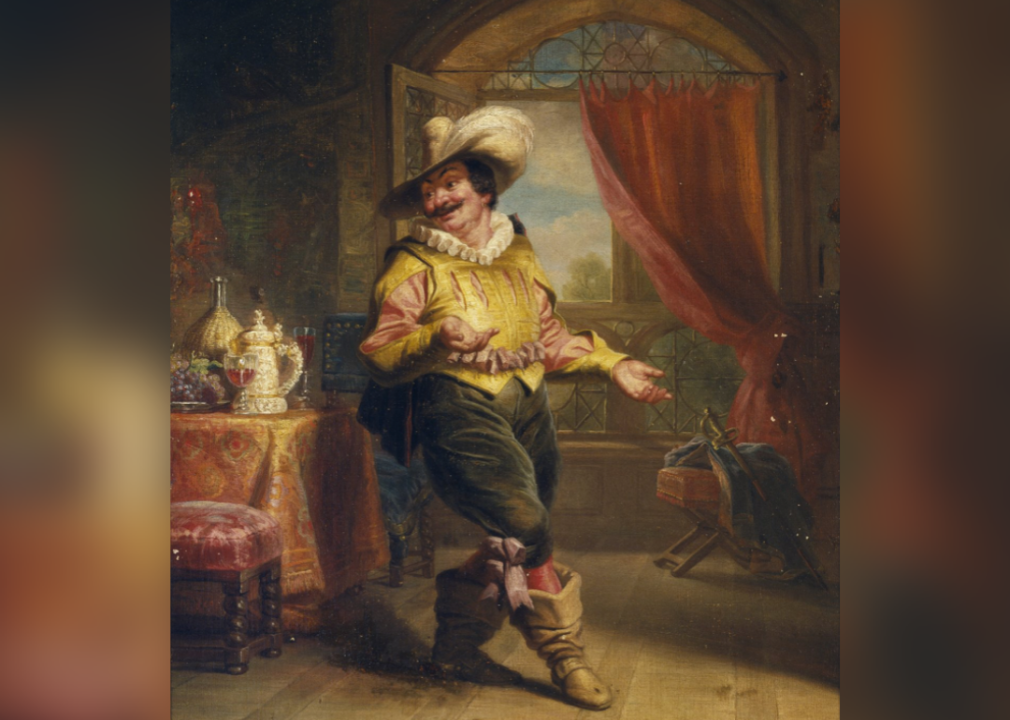
George Henry Hall // Wikimedia Commons
#29. Sir Toby Belch
Sir Toby Belch appeared in “Twelfth Night.”
Speeches: 152
Sir Toby Belch was a crude, jolly, and corrupted knight, similar to another Shakespeare character, Sir John Falstaff (who also made this list). He was so impressed by a chambermaid’s plot to take down the ill-humored and socially ambitious Malvolio that he not only teamed up with her but also married her by the end of the play.
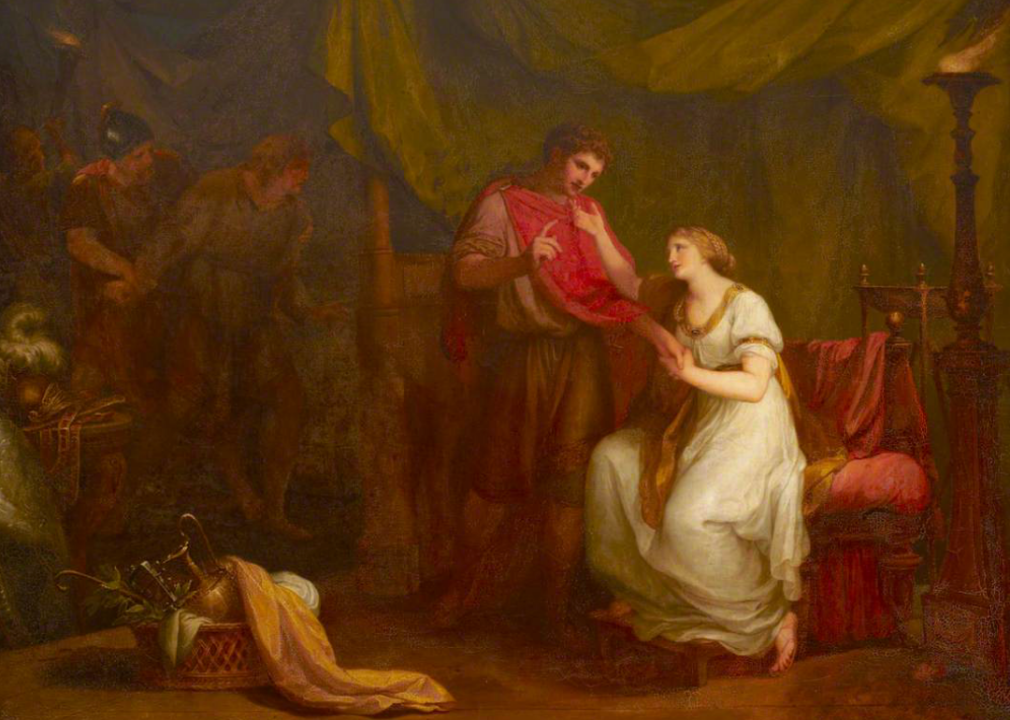
Angelica Kauffmann // Wikimedia Commons
#28. Cressida
Cressida appeared in “Troilus and Cressida.”
Speeches: 152
Cressida was a beautiful Trojan whose father defected to the Greek camp; she was Troilus’ lover and was traded to the Greeks in exchange for Trojan prisoners of war. She openly flirted with the Greeks and is often portrayed as a woman with fickle affections. Suzanne Burden and Laura Pyper are among the notable actresses to have portrayed her.
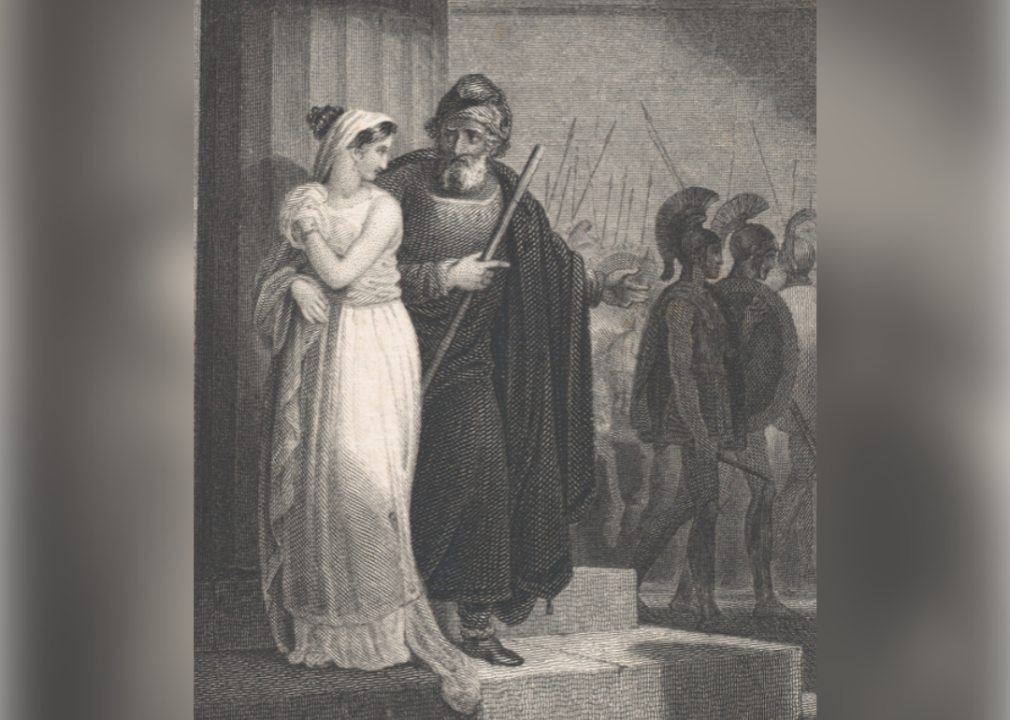
Henry Corbould // Wikimedia Commons
#27. Pandarus
Pandarus appeared in “Troilus and Cressida.”
Speeches: 153
Pandarus was Cressida’s uncle, and facilitated the meeting between Cressida and Troilus; he has been referred to as a pimp, seeing as he encouraged the characters to simply sleep together rather than share romantic moments. He is portrayed as a coward and a degenerate; Troilus cursed him at the end of the play and Pandarus had the ending soliloquy, which included complaints and a declaration that he would give the audience his “diseases.” One notable actor who portrayed Pandarus is Charles Grey.
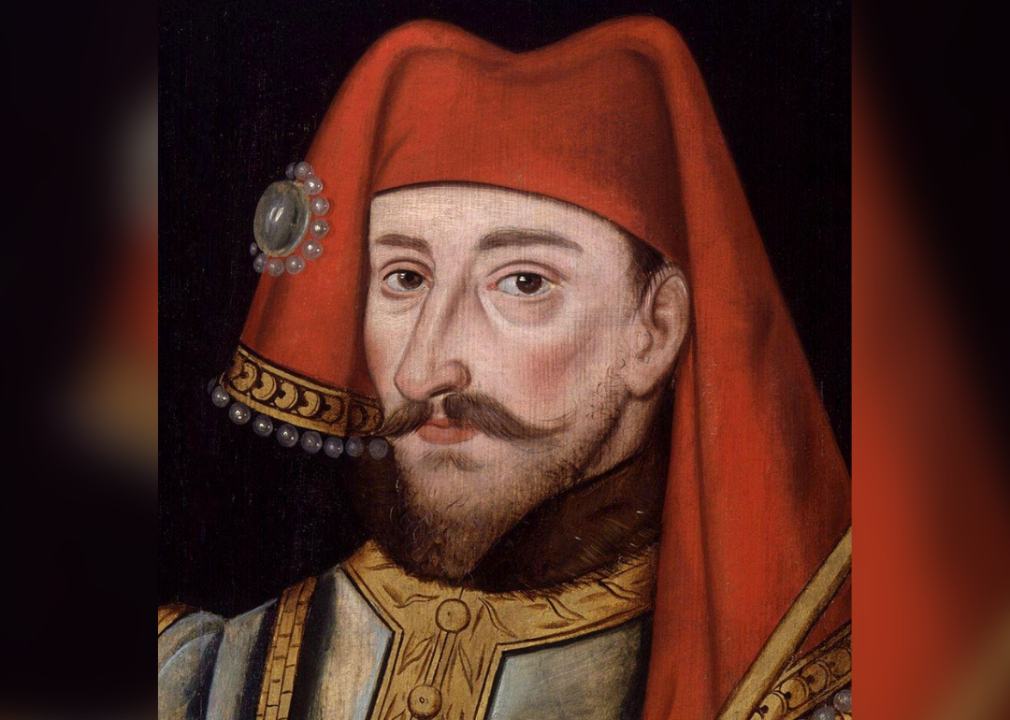
Public Domain // Wikimedia Commons
#26. Henry IV
Henry IV appeared in “Henry IV Part One,” “Henry IV Part Two,” and “Richard II.”
Speeches: 154
Henry IV was introduced as Henry Bolingbroke, Duke of Hereford, and staged a strategic takeover of the throne while Richard II was away at war in Ireland. When Richard II was murdered for Henry IV’s sake, the latter vowed to journey to Jerusalem and cleanse himself for his part in the killing. A guilt-ridden Henry IV then struggled to manage civil disputes in England.
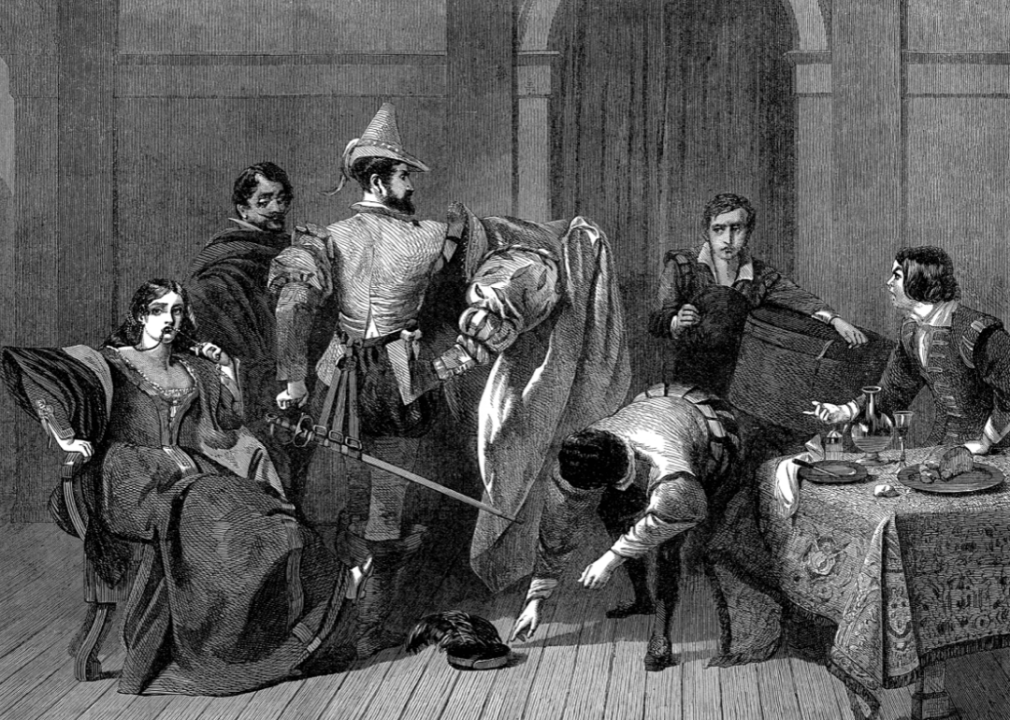
William Luson Thomas // Wikimedia Commons
#25. Petruchio
Petruchio appeared in “The Taming of the Shrew.”
Speeches: 158
Petruchio was a leading male character who decided to marry the infamously strong-willed Katharine of Padua for the challenge of “taming” her and the huge dowry he would receive. Petruchio successfully manipulated her to become more obedient and submissive to the point where she would agree with any statement he said, regardless of its logic.
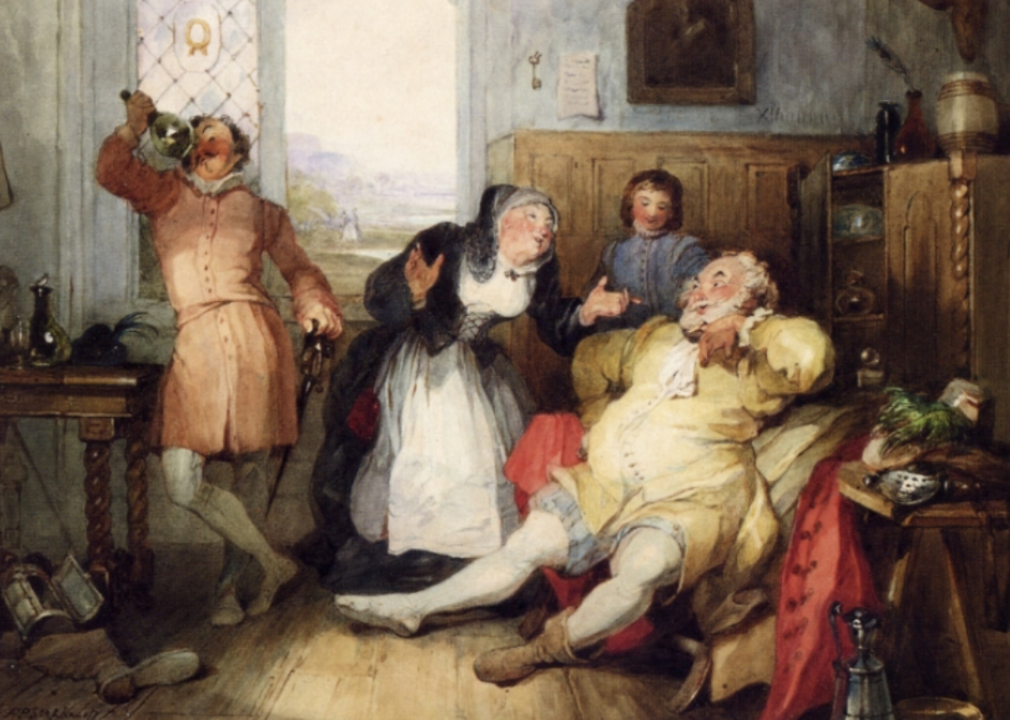
Francis Philip Stephanoff // Wikimedia Commons
#24. Hostess Quickly
Hostess Quickly appeared in “Henry IV, Part 1,” “Henry IV, Part 2,” “Henry V,” and “The Merry Wives of Windsor.”
Speeches: 158
Hostess (or Mistress) Quickly is the proprietor of the Boar’s Head Tavern in Eastcheap and her speech is often filled with double entendres and bawdy language. She was depicted as a woman with connections to criminals, but she also served as a messenger of Falstaff’s death and delivered love notes between characters in “The Merry Wives of Windsor.”
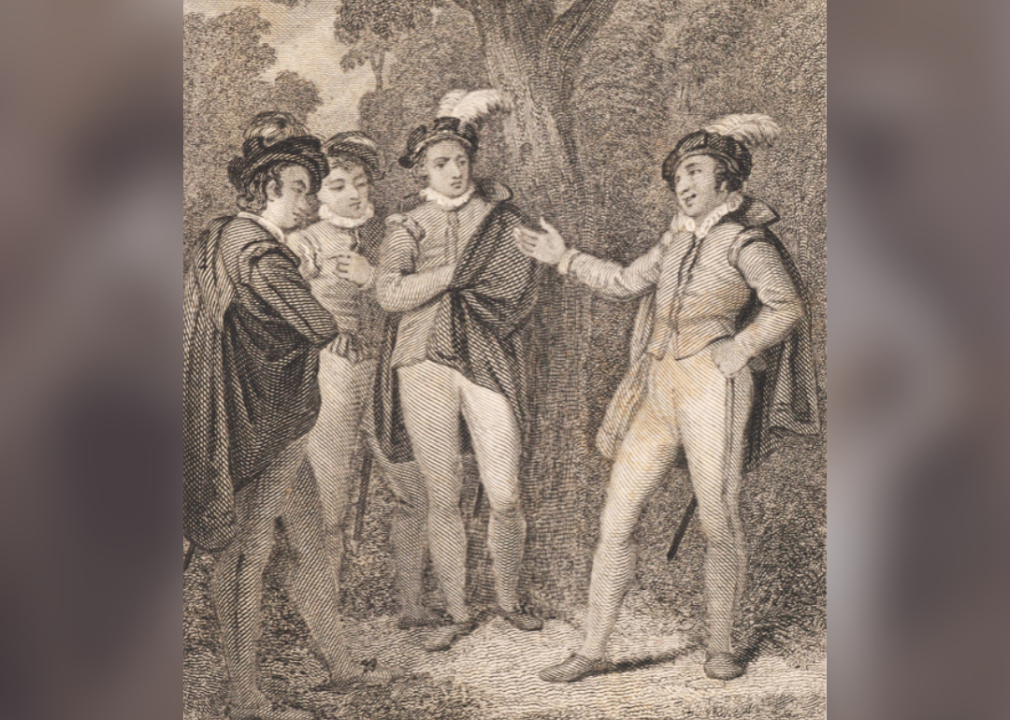
John Massey Wright // Wikimedia Commons
#23. Biron
Biron appeared in “Love Labor’s Lost.”
Speeches: 159
Biron was a well-spoken Lord in King Navarre’s court who reluctantly took the oath to be a celibate scholar for three years; Biron believed that it would be impossible for all of them to keep the oath. He fell in love with Lady Rosaline, who attended to the Princess of France, and subsequently broke his vow.
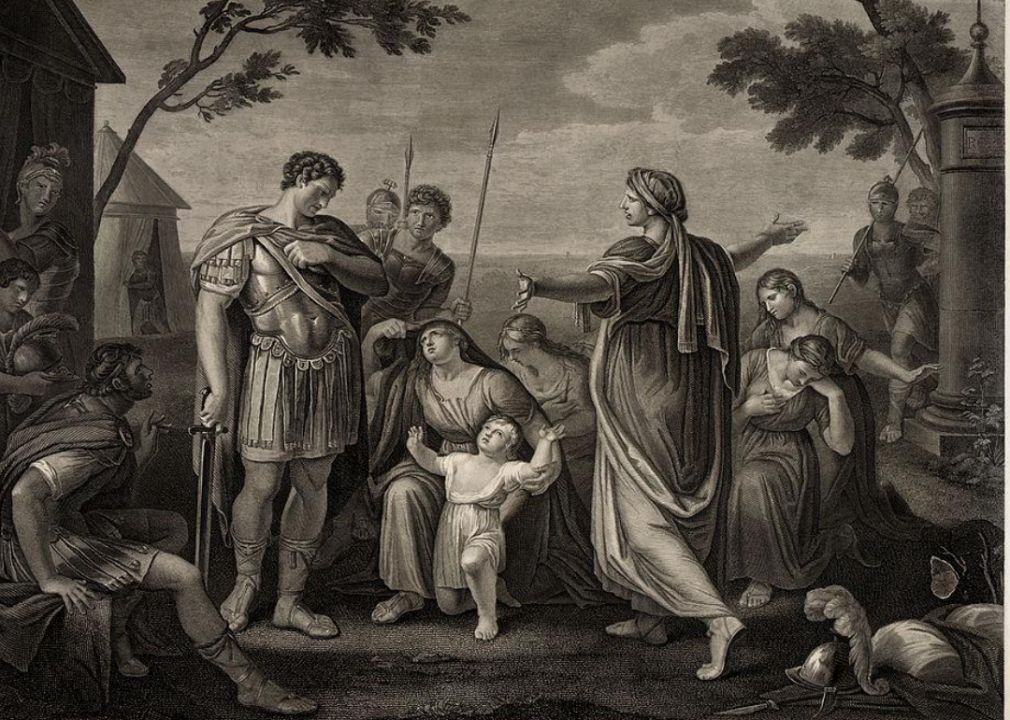
Public Domain // Wikimedia Commons
#22. Menenius Agrippa
Menenius appeared in “Coriolanus.”
Speeches: 162
Menenius was an extremely clever patrician and a friend and father figure to Coriolanus. Menenius used his wit to manipulate the plebeians to love him despite his distaste for them; in this regard, he acted as a foil to Coriolanus, who openly showed his disdain for the plebians and his ambition for power.
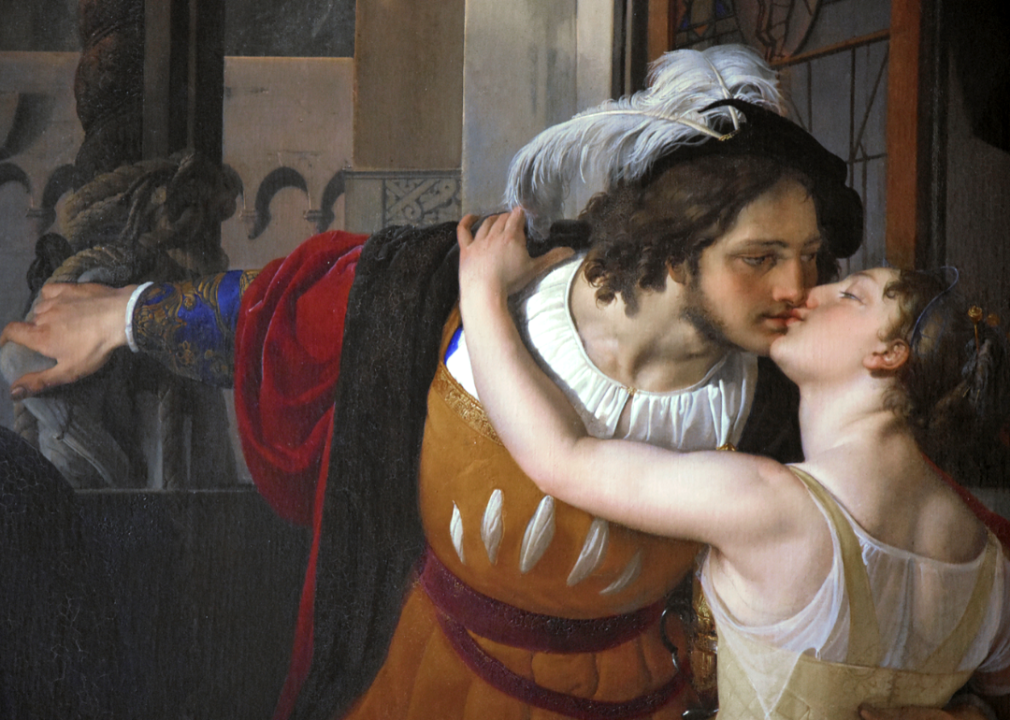
Francesco Hayez // Wikimedia Commons
#21. Romeo
Romeo appears in “Romeo and Juliet.”
Speeches: 163
Romeo was the titular character in “Romeo and Juliet,” where he was the son of Lord Montague, the head of a noble family in Verona. Some argue that Romeo’s decisions, from urging Juliet to marry him to slaying her kinsman after he killed his friend, drove the plot of the play. Notable actors and adaptations are Basil Rathbone, Leonard Whiting, and Leonardo DiCaprio.
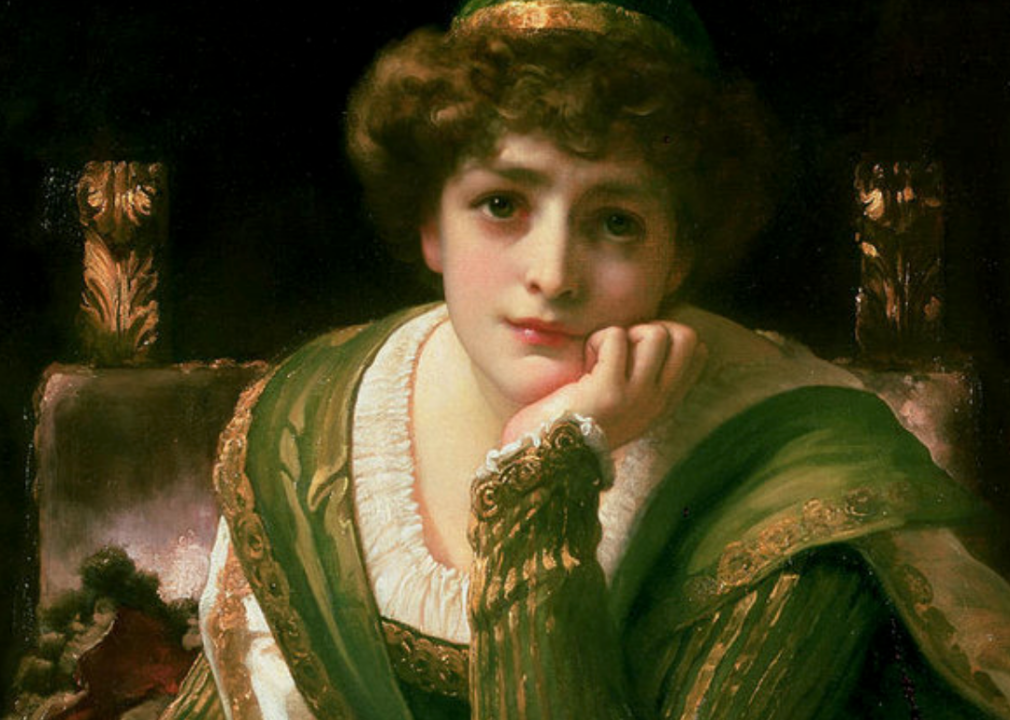
Frederic Leighton // Wikimedia Commons
#20. Desdemona
Desdemona appeared in “Othello.”
Speeches: 165
Desdemona was a Venetian beauty who enraged her father by eloping with Othello, a Moorish general in the Venetian military. A lively spirit, she was devoted and faithful to Othello even when he abused her, and blamed herself when he strangled her to death over his mistaken belief in her infidelity. Dame Maggie Smith played the role in a 1965 film adaptation.
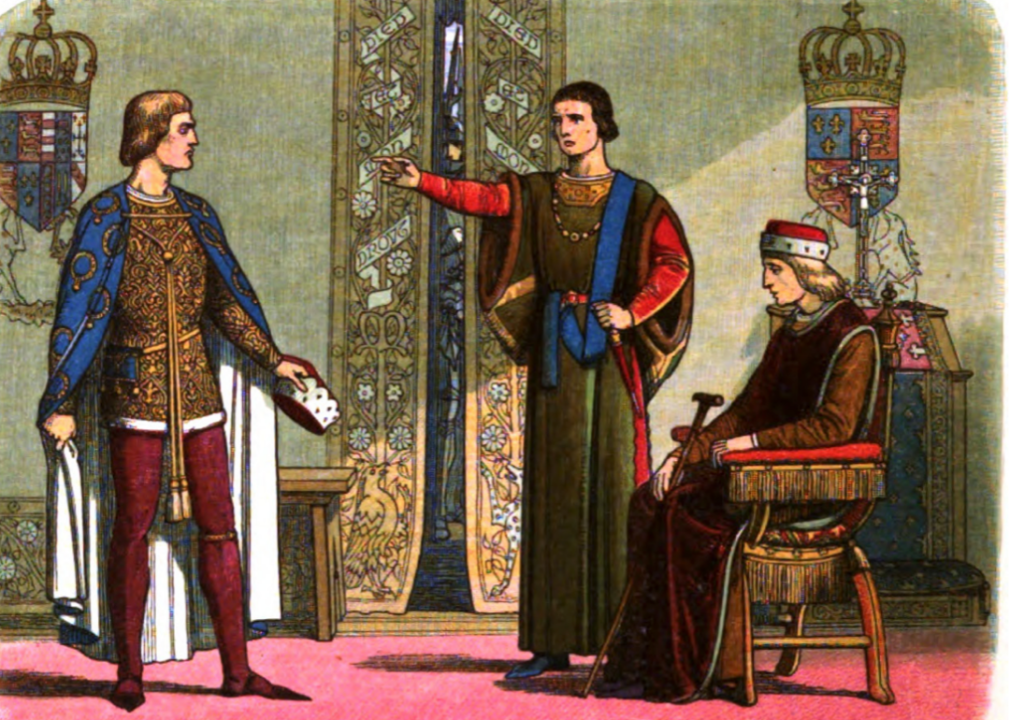
James William Edmund Doyle // Wikimedia Commons
#19. Richard Plantagenet (Duke of Gloucester)
Richard appeared in “Henry VI, Part 1,” “Henry VI, Part 2,” Henry VI, Part 3,” and “Richard III.”
Speeches: 166
Richard Plantagenet (who is not the Richard referred to simply as “Gloucester” in Richard III and Henry VI) gets most of his lines in all three Henry VI plays. While he is labeled Duke of Gloucester here, he is given the title Duke of York in “Henry VI, Part 1,” after losing all of his titles in the death of his father. In part two he is called York and is after the throne almost as much as Gloucester is.
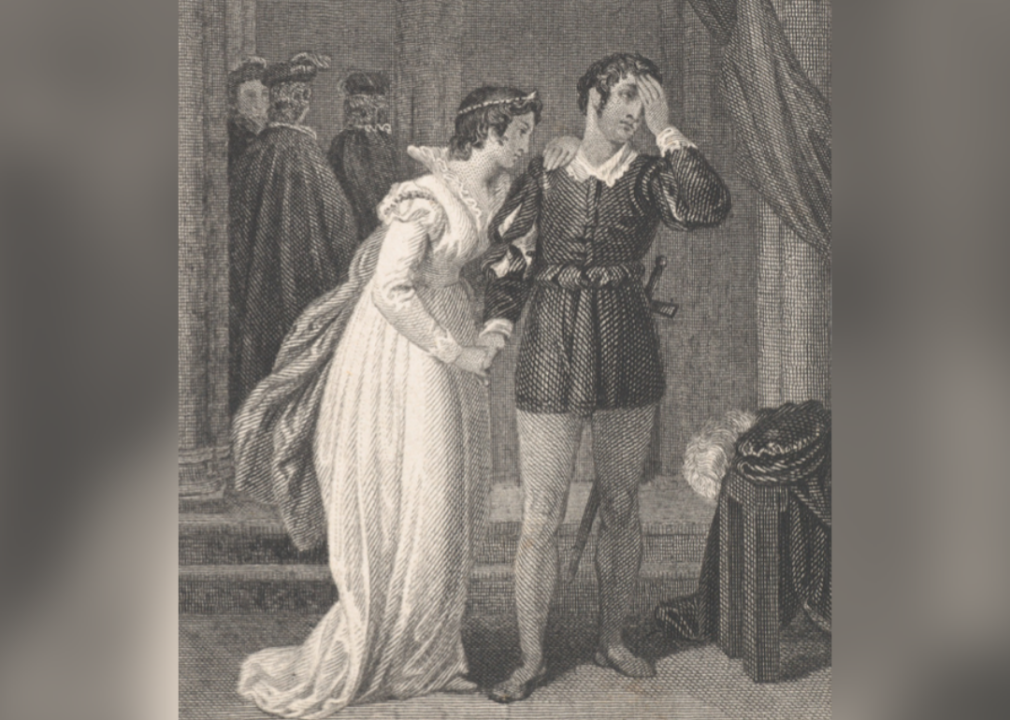
John Massey Wright // Wikimedia Commons
#18. Queen Margaret
Margaret appeared in “Henry VI, Part 1,” “Henry VI, Part 2,” “Henry VI, Part 3,” and “Richard III.”
Speeches: 169
Margaret was the widow of King Henry VI and mother of their son, Prince Edward; in the titular plays she was portrayed as a dominating, ambitious, and strategic woman who fiercely advocated for her son’s right to inherit the throne. In “Richard III” she fell to the mercy of the York family, and her curses served as prophecies. The plays and the role has been adapted for television a number of times, with famed Shakespearean actress Peggy Ashcroft playing Margaret in a 1963 TV adaptation.
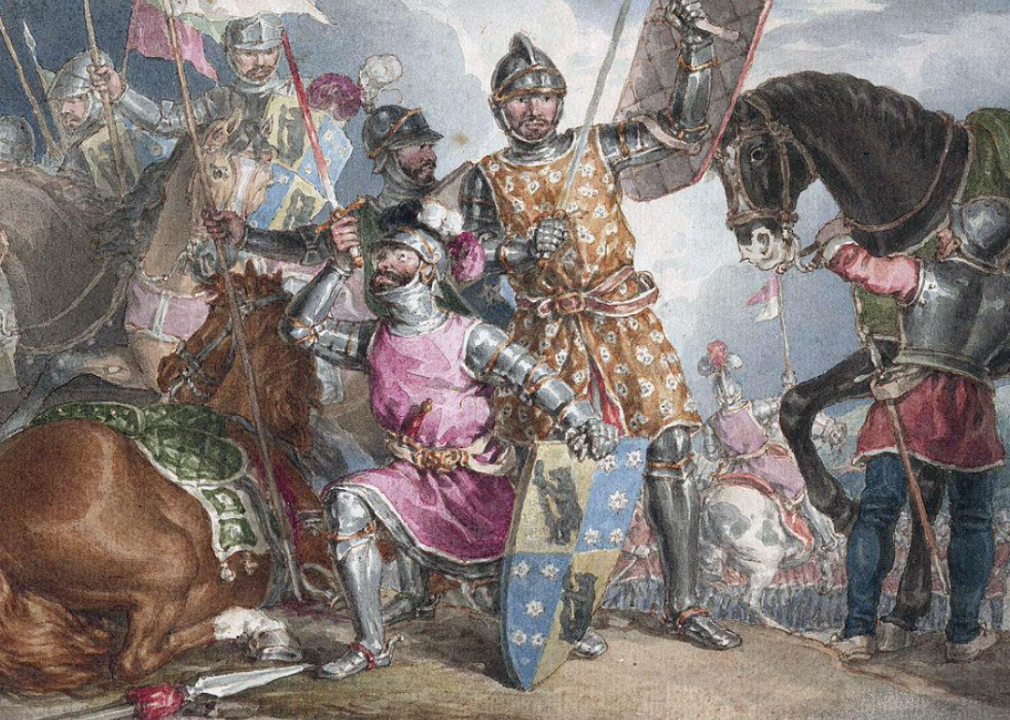
Public Domain // Wikimedia Commons
#17. Earl of Warwick
The Earl appeared in “Henry IV, Part 2,” “Henry V,” “Henry VI, Part 1,” “Henry VI, Part 2,” and “Henry VI, Part 3.”
Speeches: 182
Nicknamed “The Kingmaker” the Earl of Warwick served Lancaster kings as an aid and adviser to King Henry IV and King Henry V. The Earl supported the House of York’s claim to the throne only to be slighted by King Edward IV when he married Elizabeth Gray; he decided to support Queen Margaret’s power grab only to die in battle and realize that all of his “kingmaking” ultimately meant nothing.
Note: There are technically two Earls across these plays. Henry IV-Henry VI Part One is Richard de Beauchamp, the 13th Earl. Richard “Kingmaker” Neville is the 16th Earl.
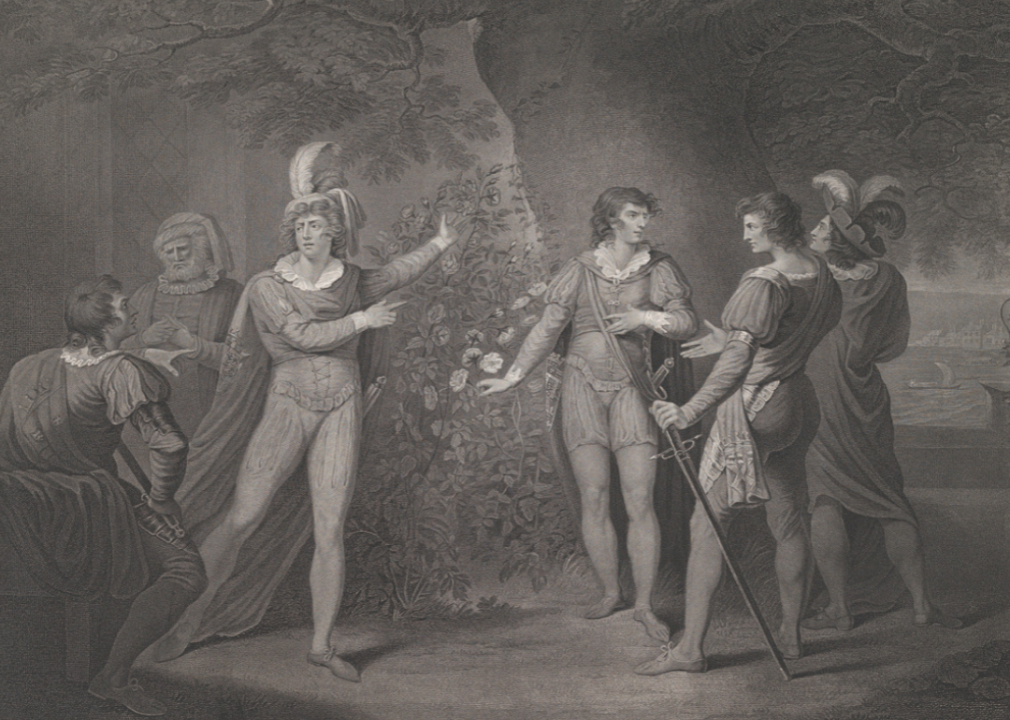
John Ogborne // Wikimedia Commons
#16. Henry VI
Henry VI appeared in “Henry VI, Part 1,” “Henry VI, Part 2,” “Henry VI, Part 3,” and mentioned in “Richard III.”
Speeches: 183
Henry VI was the son of the famous Henry V, who was killed in battle; as such, Henry VI relied on the words of scheming advisers for the majority of his life. Throughout his reign, he struggled to calm the conflict among the nobility and lost the lands in France that his father gained; he ultimately wished to rule in name while someone else had control.
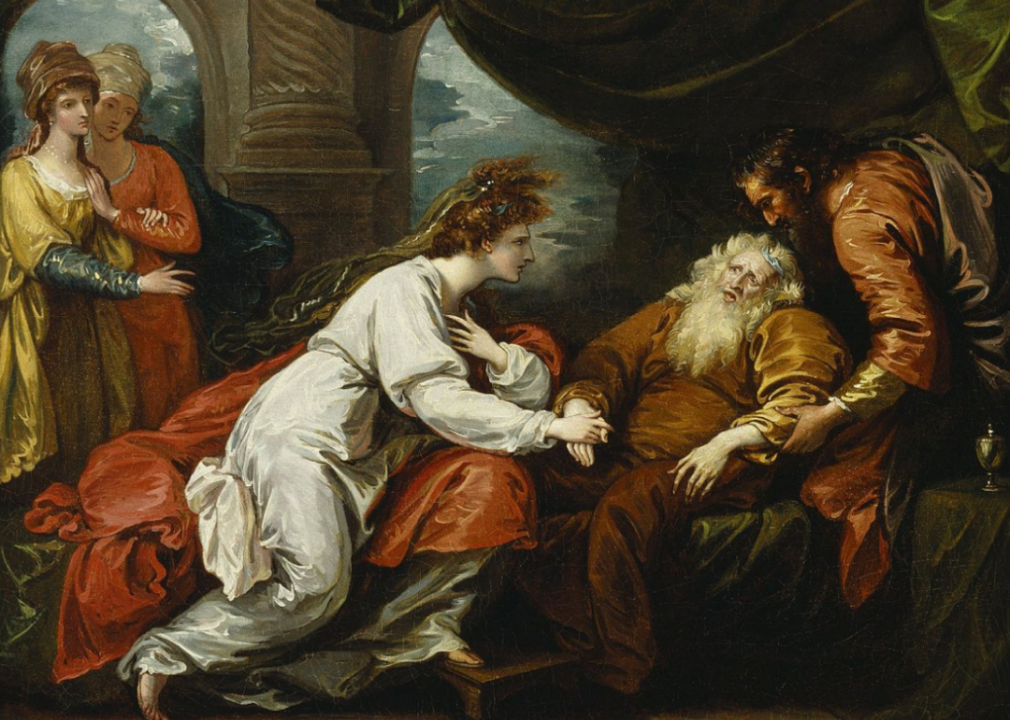
Benjamin West // Wikimedia Commons
#15. Lear
Lear appeared in “King Lear.”
Speeches: 188
Lear was the narcissistic king of Britain who decided to divide his kingdom between his two eldest daughters, who gave him false flattery, and disowned his youngest daughter, who was truly loyal to him. His actions resulted in a loss of power and a descent into madness. Notable actors who played Lear are Henry Irving, Donald Wofit, and Laurence Olivier.
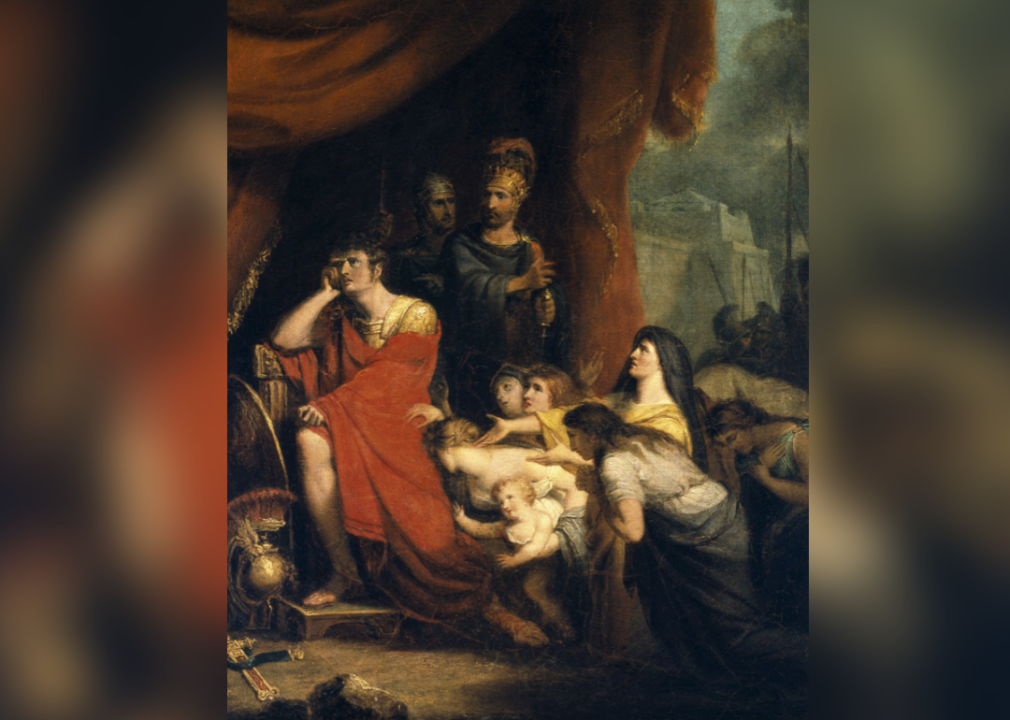
Richard Westall // Wikimedia Commons
#14. Coriolanus
Coriolanus appeared in “Coriolanus.”
Speeches: 189
Caius Marcius Coriolanus was a brilliant Roman general who openly despised the plebian class and earned the disdain of other Roman politicians. His arrogance, thirst for power and inability to play politics like his friend Menenius Agrippa ultimately contributed to his downfall. Notable actors include Tom Hiddleston and Ralph Fiennes.
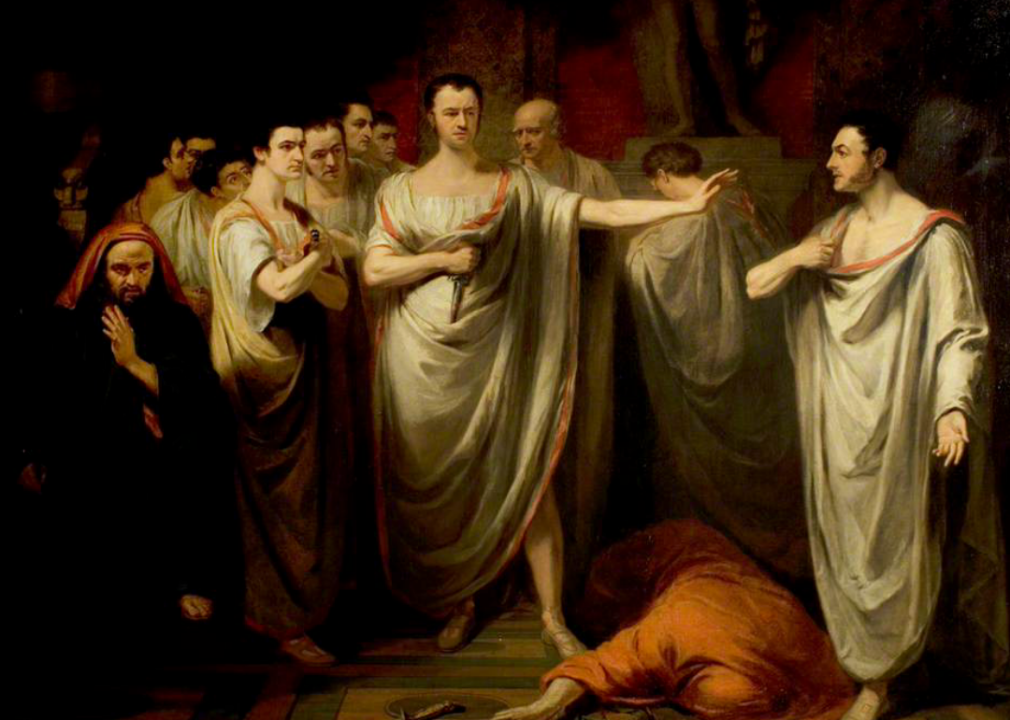
George Clint // Wikimedia Commons
#13. Brutus
Brutus appeared in “Julius Caesar.”
Speeches: 194
Marcus Brutus was a supporter of the Roman Republic and a dear friend to Julius Caesar; Cassius manipulates Brutus into joining the conspirators. While the others were motivated by ambition and envy, Brutus genuinely believed that Caesar as the sole ruler of Rome would not have been good for the Republic. The play focused on his struggle to walk the lines between loyalty, duty, and friendship. Notable actors to take on the iconic character include James Mason and Paterson Joseph.
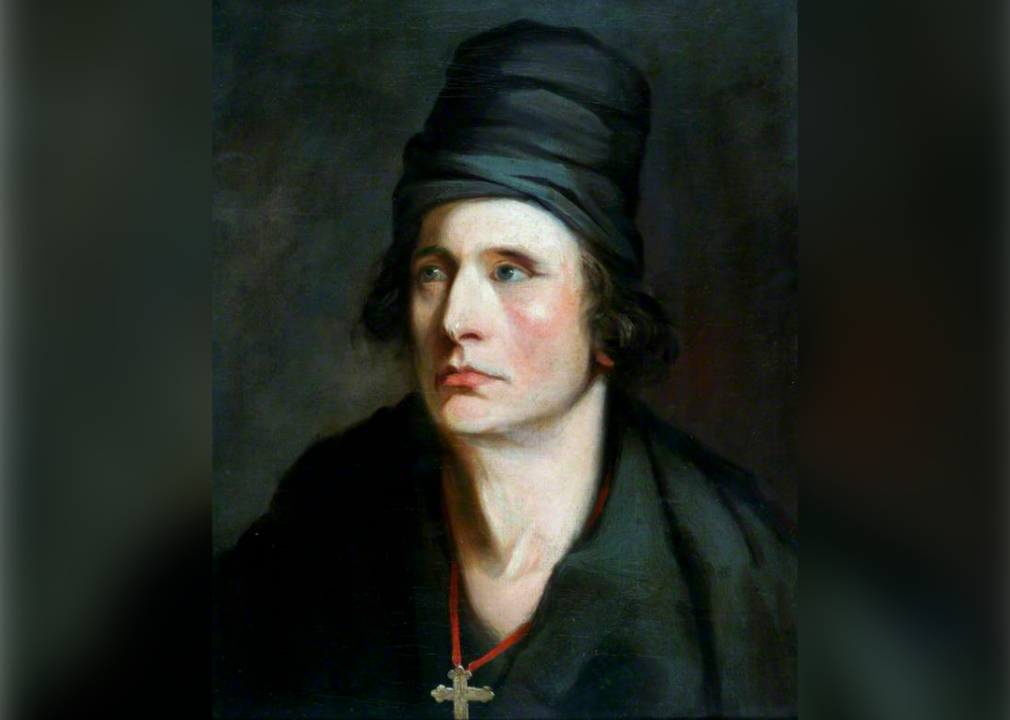
Victoria and Albert Museum // Wikimedia Commons
#12. Vincentio
Vincentio appeared in “Measure for Measure.”
Speeches: 194
Vincentio, the Duke of Vienna, was good-natured and couldn’t bring himself to punish people when they broke the law. He left his deputy Angelo in charge and then impersonated a friar to spy on Angelo and the people of Vienna.
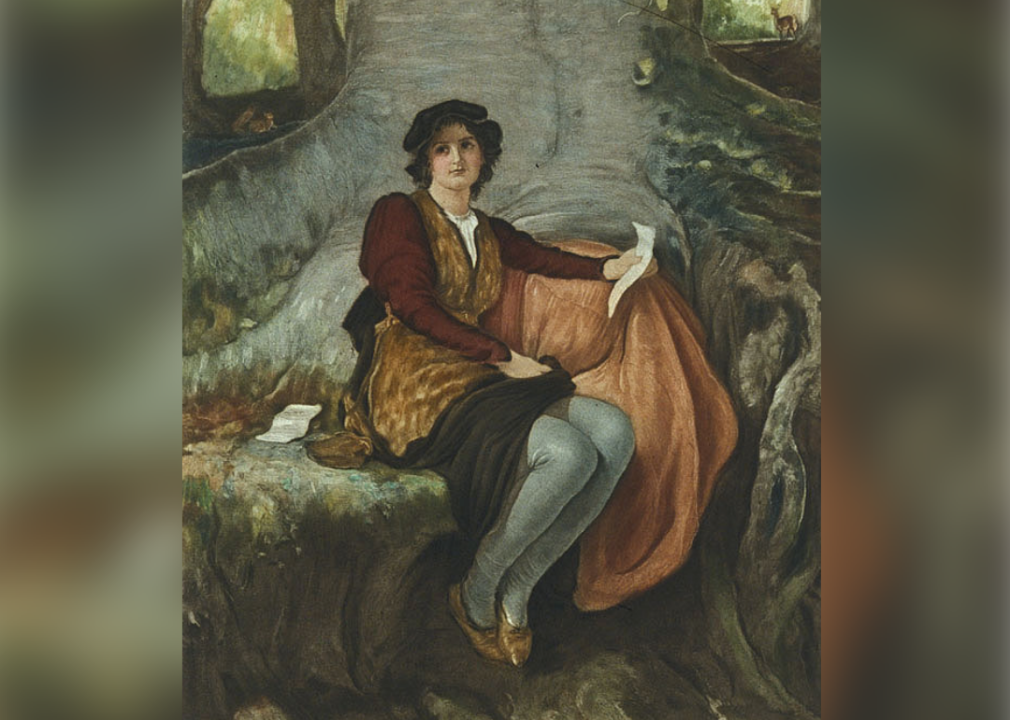
Robert Walker Macbeth // Shutterstock
#11. Rosalind
Rosalind appeared in “As You Like It.”
Speeches: 201
Rosalind was the strong-willed, clever, and good-hearted protagonist of “As You Like It.” She was banished from court by her uncle, and used that opportunity to help the people around her; her character dominated the play.
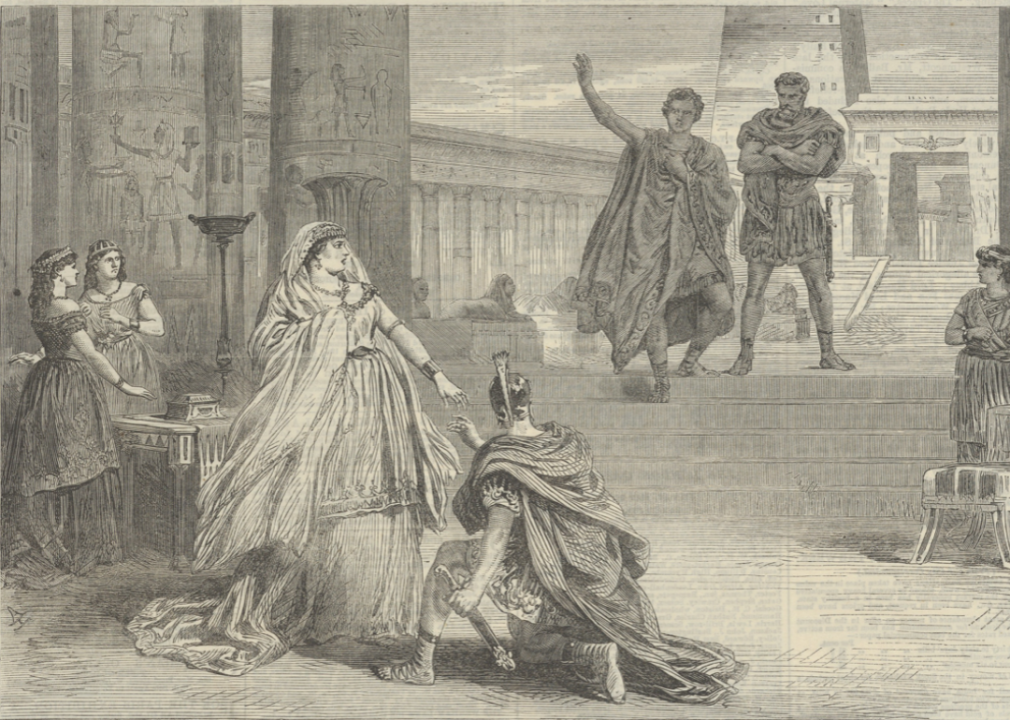
Arthur Hopkins // Wikimedia Commons
#10. Cleopatra
Cleopatra appeared in “The Tragedy of Antony and Cleopatra.”
Speeches: 204
Cleopatra was the queen of Egypt who took on powerful men as lovers and was intense in her emotions. She is regarded as one of the most powerful and empowered women in Shakespeare’s plays, and while she could be fickle in her affections, she showed that she ultimately loved Mark Antony, choosing suicide rather than life without him. Notable actors to depict Cleopatra include Kim Cattrall, Mark Rylance, and the legendary Elizabeth Taylor.
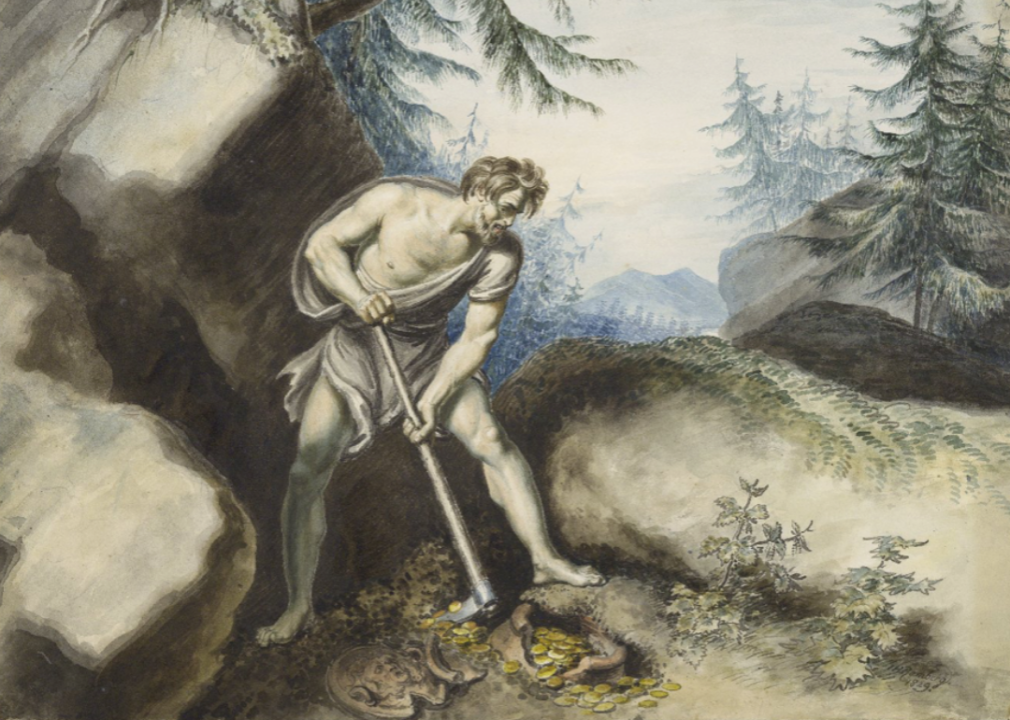
Johann Heinrich Ramberg // Wikimedia Commons
#9. Timon
Timon appeared in “Timon of Athens”
Speeches: 210
Timon was a lord of Athens who was once extremely generous to others because he believed that friendship meant giving without asking in return. After those same people refused to help him with his debts, Timon denounced humanity for being villainous and self-serving. His lack of support when in need balanced by the people who seek him out explored the questions of whether generosity or friendship are things to be advised against.
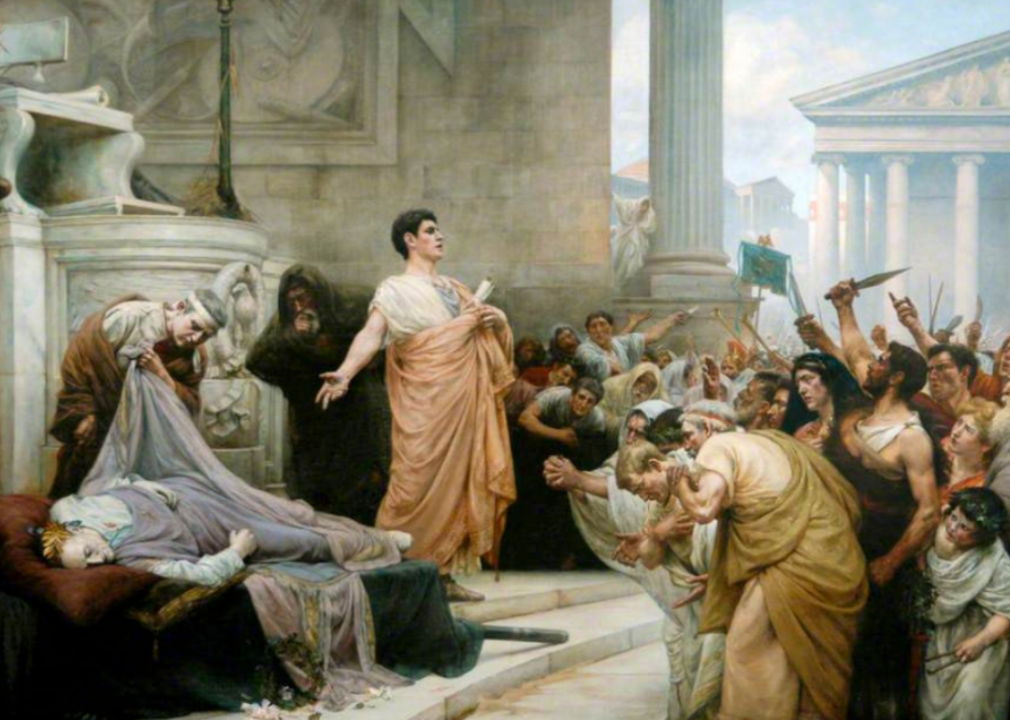
George Edward Robertson // Wikimedia Commons
#8. Antony
Antony appeared in “Julius Caesar” and “The Tragedy of Antony and Cleopatra.”
Speeches: 253
Mark Antony was first introduced as a hedonistic character who made his military fortunes by besting the forces of Brutus and Cassius after Caesar’s death; he became one of the three rulers of the Roman Republic. Antony struggled between his duties as an honorable leader and his luxurious life with Cleopatra. Richard Burton played the famous role in the 1963 film version of the play, “Cleopatra.”
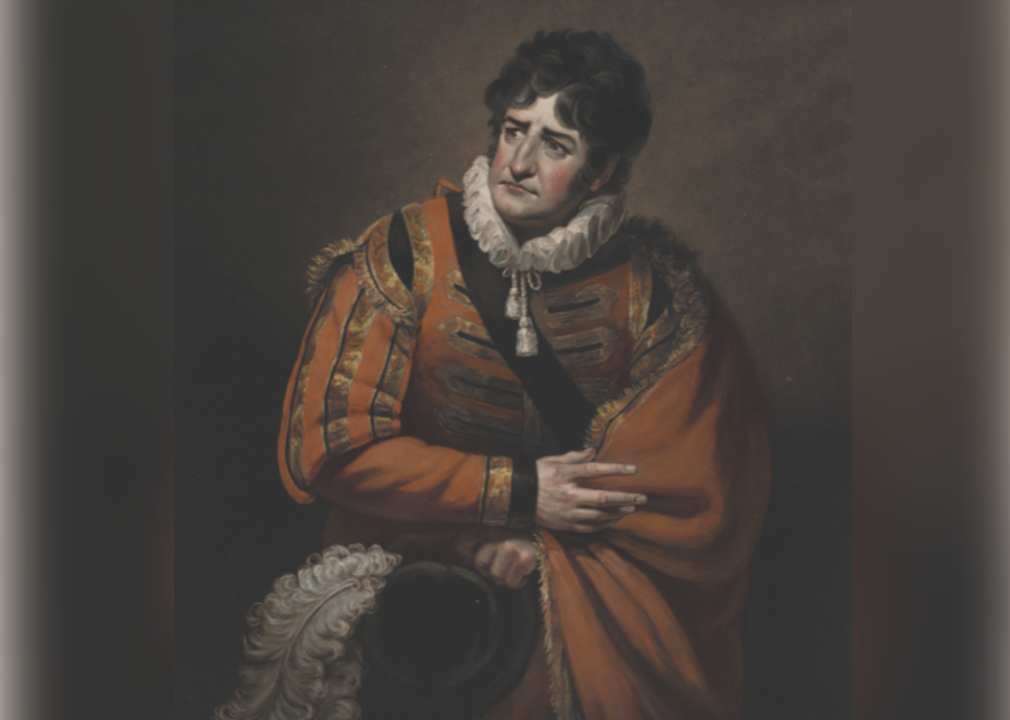
James Ward // Wikimedia Commons
#7. Iago
Iago appeared in “Othello.”
Speeches: 272
Iago was an ensign serving with Othello and became resentful of him when the latter promoted another soldier whom Iago considered inferior. Iago subsequently conspired against Othello and enjoyed manipulating people around him; he was eventually exposed and condemned to be imprisoned and tortured. Notable actors include Sir Ian McKellen, Sir Kenneth Branagh, and Rory Kinnear.
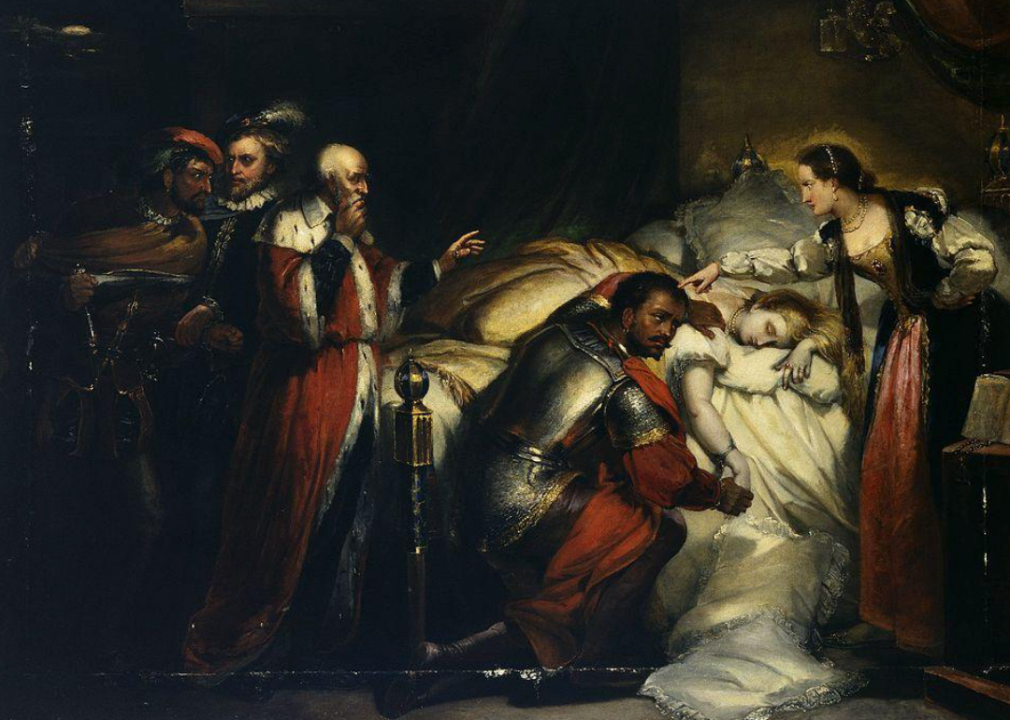
Public Domain // Wikimedia Commons
#6. Othello
Othello appeared in “Othello.”
Speeches: 274
Othello was an experienced Moorish general in the Venetian military who convinced a Venetian woman to elope with him to Cyprus; he was considered a racial and cultural outsider and exoticized by the other characters. Othello was manipulated by Iago to believe that his wife, Desdemona, was unfaithful; after abusing and then killing Desdemona, Othello realized his mistake and killed himself. You may have seen this role on the big screen, played by Sir Patrick Stewart, Laurence Fishburne, and Mekhi Phifer.
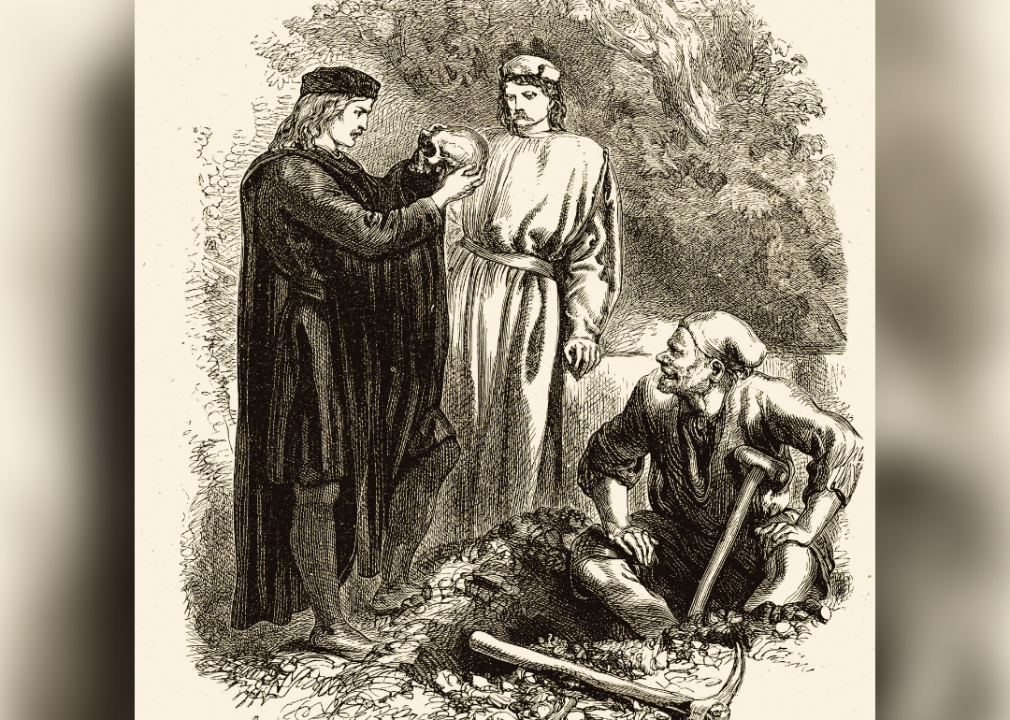
Canva
#5. Hamlet
Hamlet appeared in “Hamlet.”
Speeches: 358
Hamlet was the main character of the titular play, the son of the deceased King Hamlet, and nephew of the current King Claudius; the quest to avenge his father’s death drove the plot. The character is one of Shakespeare’s most recognizable, with many soliloquies (“To be, or not to be”) and lines (“Get thee to a nunnery”) still quoted and referenced in modern-day. Notable actors to portray him include Edwin Booth, John Barrymore, Ian Charleson, Sir Kenneth Branagh, Ben Whishaw, and Tom Hiddleston.
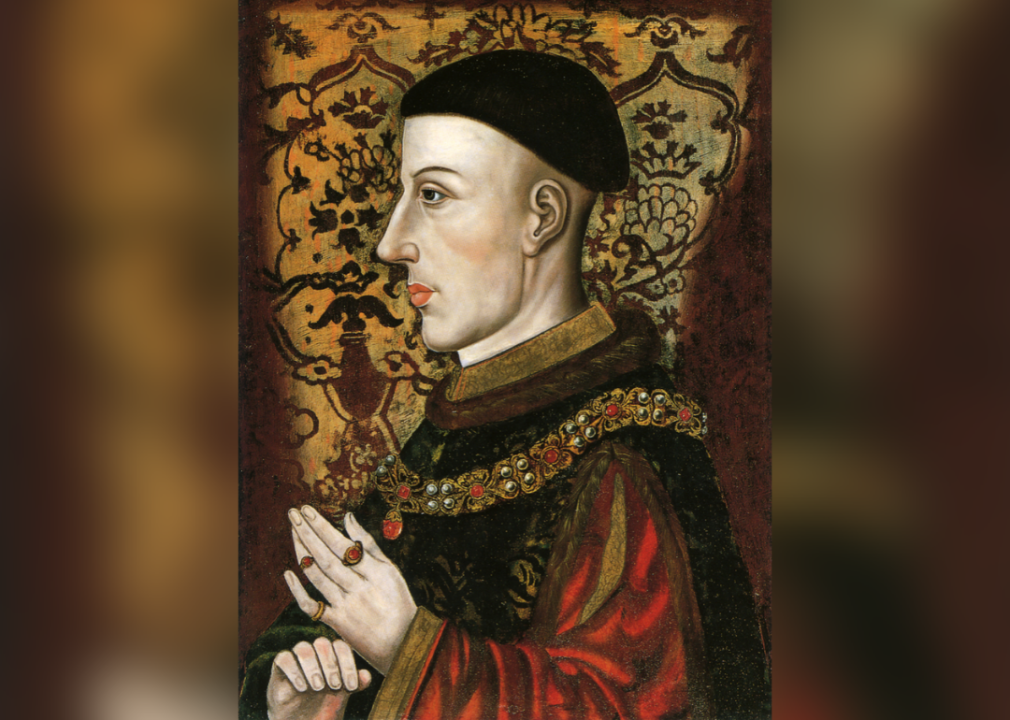
National Portrait Gallery // Wikimedia Commons
#4. Henry V
Henry V appeared in “Henry IV, Part 1,” “Henry IV, Part 2,” and “Henry V.”
Speeches: 377
Henry V was a charismatic and intelligent king committed to the responsibilities tied to having the throne. He was goal-driven and used his oratory skills to justify his claims to conquer France and motivate his troops. Tom Hiddleston played Henry V in the “Hollow Crown” TV series.
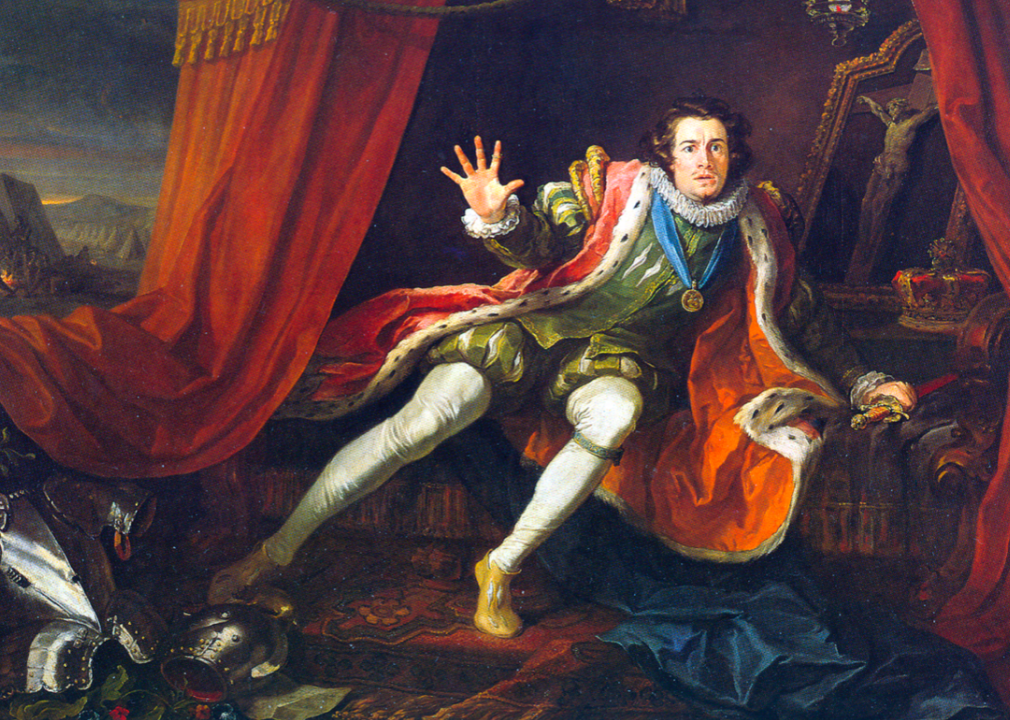
William Hogarth // Wikimedia Commons
#3. Richard III (Duke of Gloucester)
Richard III appears in “Henry VI, Part 3” and “Richard III”
Speeches: 409
Not to be confused with Richard Plantagenet, who is also labeled as Gloucester in “Henry VI,” Richard III is the main character in the play of the same name. Richard was the brother of King Edward IV and Duke of Gloucester who greatly desired to be king and would stop at nothing to do so. While he was evil and manipulative, he was also intelligent and captivated audiences with his use of language and political savvy. Notable actors include Sir Ian McKellen, Al Pacino, and Laurence Olivier. Actor Peter Sellers reportedly had aspirations to play the role himself but appeared instead in a 1965 TV special about The Beatles’ music reciting “A Hard Day’s Night” in the style of Olivier’s Richard III.
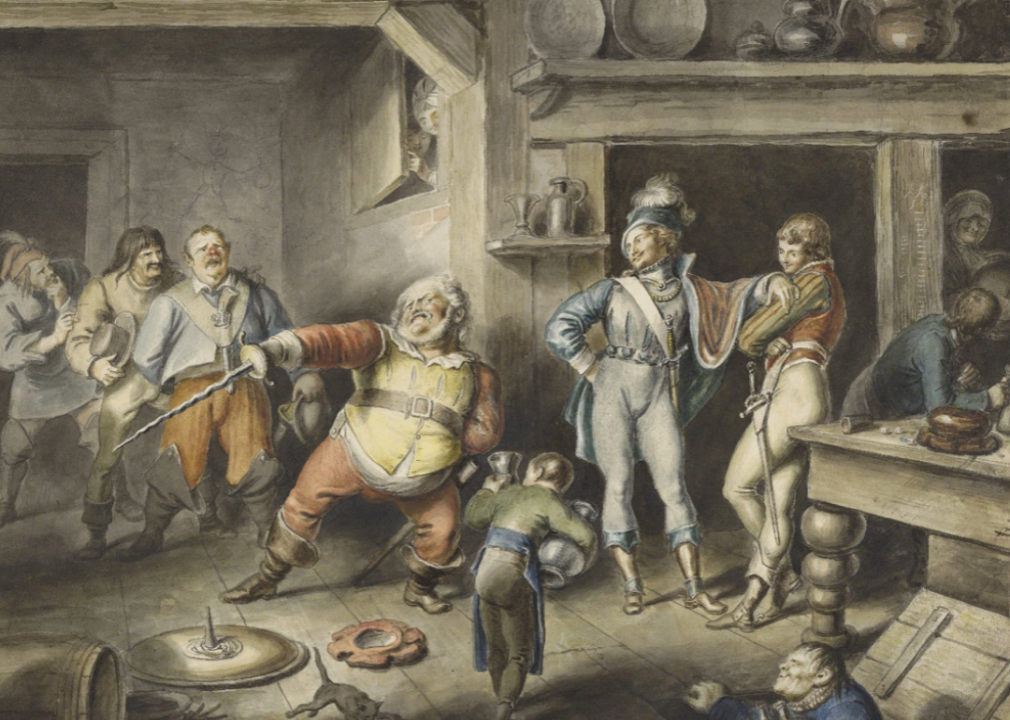
Johann Heinrich Ramberg // Wikimedia Commons
#2. Falstaff
Falstaff appeared in “Henry IV, Part 1,” “Henry IV, Part 2,” and “Merry Wives of Windsor,” and is mentioned in “Henry V.”
Speeches: 471
Sir John Falstaff was a disgraced knight, braggart soldier, and a friend of Prince Hal; he was a flawed character in that he accepted bribes and had no qualms exploiting other characters. However, audiences loved Falstaff because he was a charismatic character and had a good sense of humor.
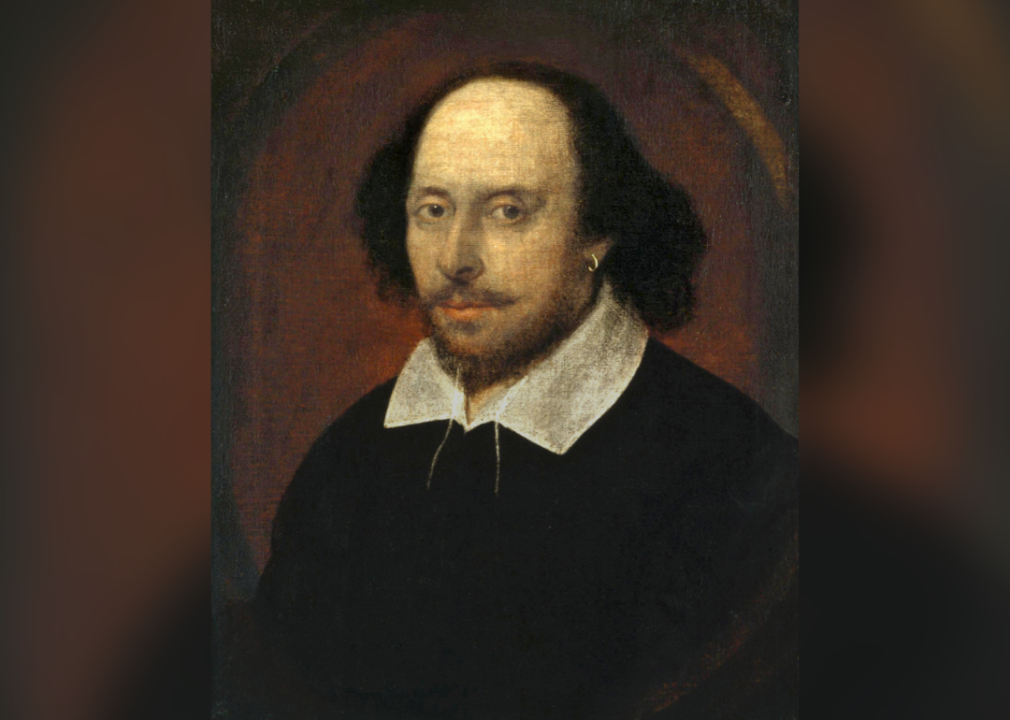
John Taylor // Wikimedia Commons
#1. Shakespeare
Shakespeare appeared in the “First Folio” (which contains most of Shakespeare’s most famous works).
Speeches: 733
It’s thought that Shakespeare himself appeared in his own plays, particularly because he was listed as a principal actor in the posthumously published “First Folio” edition of most of his most famous plays. Nicholas Rowe, an actor who wrote the first critical edition of Shakespeare’s works, referred to him as “the Ghost in his own Hamlet.” Shakespeare was part of Lord Chamberlain’s Men, an acting troupe, and became the co-owner of the now-renowned Globe Theatre. The first play that was likely performed at Shakespeare’s famous playhouse was “Julius Caesar” in 1599.